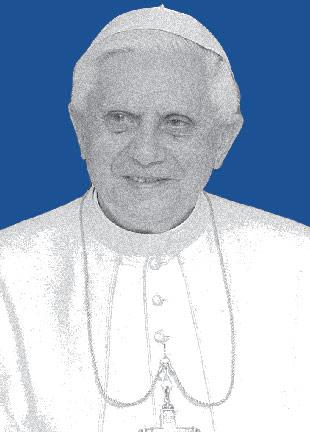


SINGLE








On the first leg of a six-day visit to his Bavarian homeland, Pope Benedict XVI urged a revival of religious values in a society that he said risks going “deaf” to God.
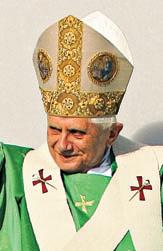
“Put simply, we are no longer able to hear God - there are too many different frequencies filling our ears,” the Pope said at a Mass in Munich on September 10.
“Along with this hardness of hearing or outright deafness where God is concerned, we naturally lose our ability to speak with him and to him. And so we end up losing a decisive capacity for perception,” he said.
The Pope spoke to some 250,000 people gathered at a fairground in Munich, where he was archbishop from 1977 to 1981. Arriving for the liturgy, he was cheered as he rode a Popemobile through a crowd that waved German, Bavarian and Vatican flags.
When people lose the ability to communicate with God, he said, they also lose a capacity for perception. This “dangerously curtails the range of our relationship with reality,” he said.
The Pope told reporters on his plane that he was making the September 9-14 visit in part to see and thank the people who made a difference in his life and to join fellow German Catholics in celebrating their faith.
But the Pope also took aim at secularisation in his homeland, explaining at an airport welcoming ceremony on September 9 that he worried whether the centuries of Christian values were being transmitted to younger generations of Germans.
The next day at the Mass, which was broadcast across Germany, the Pope focused on liturgical readings that spoke of God as the centre of all reality and the centre of personal life.
When people lose the ability to
Continued on Page 2
A weekend of weddings, and dreams underway, for staff of The Record
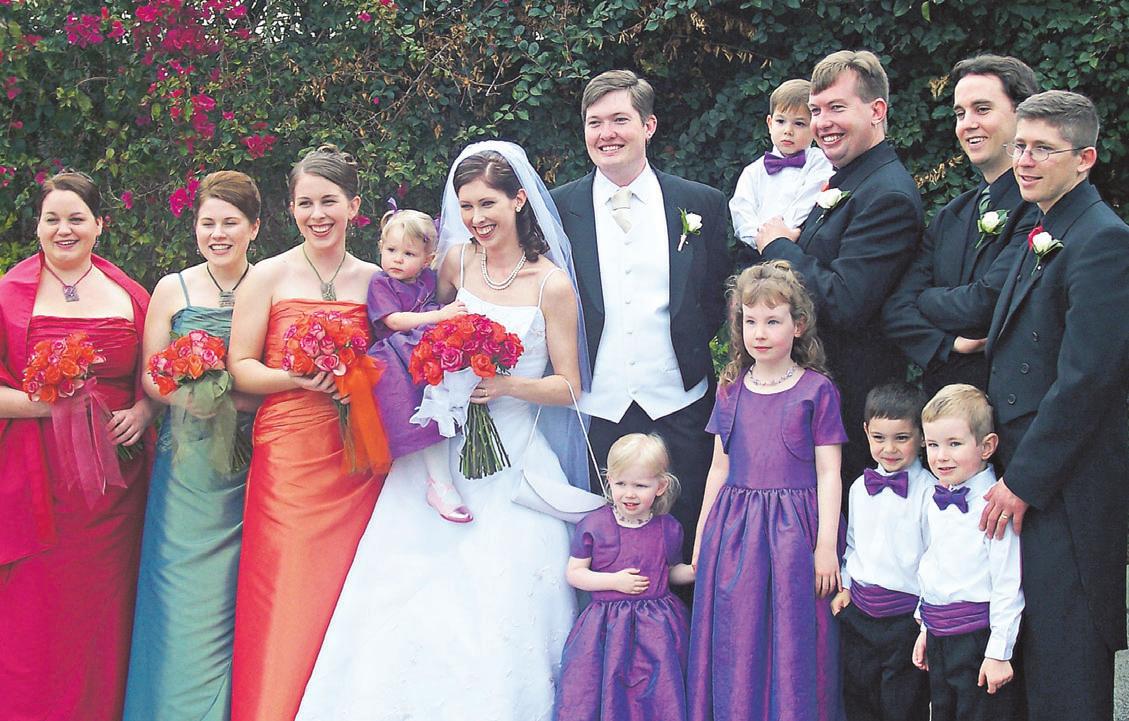
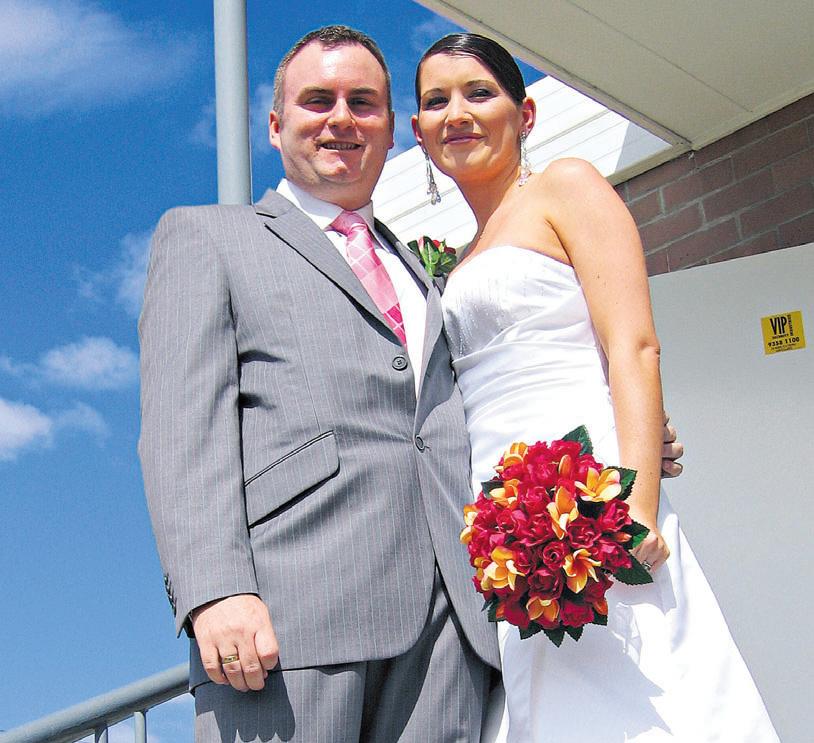
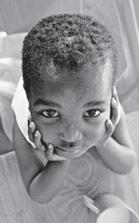
What are the chances of that? For weeks Record editor Peter Rosengren and other staff had been careful to explain to callers that when Terence Boylen, The Record’s Production Manager, and Kathi Horobin, a Record Administration Assistant, were leaving last weekend to get married, it was not to each other. Instead, both staff had independently chosen the same weekend for their weddings.
Terence married Sarah Chamberlain at Our Lady of the Missions Church in Whitfords (top) while Kathi married Andrew Harp at St Dominic’s in Innaloo.
Photos: Linda Jolliffe and Miller Lo.
By
Paul GrayRadical Islamists are using a controversial Victorian law against religious vilification to silence their critics, says influential priest and publisher Fr Paul Stenhouse MSC.
Fr Stenhouse, editor of Annals Australasia magazine, warns that “critical appraisal by non-Muslims of Islamic law and custom” is being prevented in Victoria under pain of being hauled through the courts and charged with vilifying a religion.
This is a dangerous interference with free speech, he suggests.
“It is self-evident that a democracy must permit the free and open discussion of ideas, and that necessarily includes religion and politics,” Fr Stenhouse says.
The Victorian anti-vilification law has been supported by
Continued on Page 5
■ By Sherilee
KingstonThe Good Shepherd Parish in Lockridge celebrated Father’s Day a day early with a ‘Breakfast for Blokes’ held on Saturday September 2.
The parish has a tradition for commemorating Father’s and Mother’s day during the Sunday Masses on their special day. Each year all fathers and mothers receive a special blessing and a prayer card prepared by the Liturgy group.
The 57 parishioners who attended the breakfast were served a meal of bacon, eggs, sausages, muffins and toast. The guest speaker for
Continued on Page 6

Continued from Page 1 communicate with God, he said, they also lose a capacity for perception. This “dangerously curtails the range of our relationship with reality,” he said.
The Pope said belief in God is not something that removes people from the world, but draws them closer to a sense of responsibility and justice in society. Christians in particular reflect Jesus’ concern for the poor and marginalised, he said.
“We are not asking for something off in the distance,” he said. “We pray that justice and love may become the decisive forces affecting our world.”
Dressed in brilliant green vestments, the Pope celebrated Mass on a platform decorated with yellow and white flowers, beneath a sky that matched the blue of the Bavarian flags.
Martin Strasser came to the Mass from a nearby village with the rest of his volunteer firefighter unit, including several Protestants. He said he was paying particular attention to the sermon, “so I can find out something of the motivation of the Pope and the issues he considers important.”
Others said the Pope’s Bavarian connection made the Mass special.
“It sends shivers down your spine to hear the Bavarian Pope speak. His words were good, but you never agree with him 100 per cent,” said Juergen Schwarz.
Seated near the Pope were Germany’s bishops, and the Pope praised their efforts and the German church’s generosity toward poorer areas of the world.
The Pope also expressed a gentle criticism. He said some African
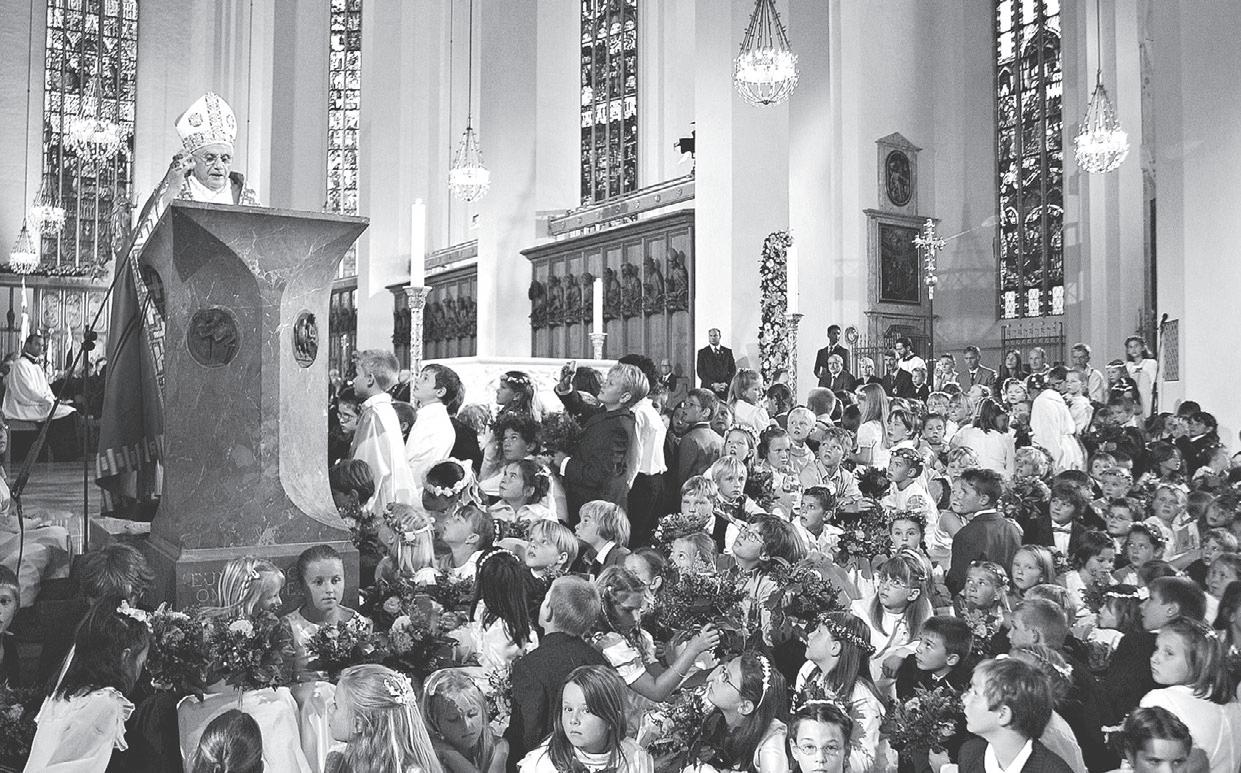
bishops have told him that German church organisations are happy to open purse strings for social projects, but are less than enthusiastic about funding evangelisation initiatives.
These Third World bishops, he said, understand that evangelisation comes first.
The Pope said Christ must be known and hearts must be converted “if progress is to be made on social issues and reconciliation is to begin, and if, for example, AIDS is to be combated by realistically facing its deeper causes.”
“Social issues and the Gospel are
inseparable. When we bring people only knowledge, ability, technical competence and tools, we bring them too little,” the Pope said.
The Pope drew on his experience in dealing with African and Asian bishops to make a wider point: that Western secular trends worry many in the developing world.
“They are frightened by a form of rationality that totally excludes God from man’s vision, as if this were the highest form of reason and one to be imposed on other cultures, too,” he said.
He said these people feel threatened by the “contempt for God” and


by a cynicism that considers “mockery of the sacred to be an exercise in freedom.”
While Western societies often preach tolerance, the Pope said what the world really needs is a tolerance that “includes the fear of God” and respect for what others hold sacred.
The theme of the papal visit was “He who believes is never alone,” and the Pope emphasised that liturgies and prayers are what bring the Catholic community together in a special way.
But the Pope said he was also thinking of other Christian communities, particularly Lutherans and Orthodox, during his visit.
In a welcoming speech at the airport, President Horst Koehler, a Protestant, made a point of underlining the strong desire of many Germans for ecumenical progress. His words were greeted by strong applause among the several hundred people who sat in bleachers and watched the brief ceremony.
The Pope departed from his prepared remarks to respond, telling the president that while the Church cannot simply erase 500 years of separation it is committed to working toward Christian unity “with our hearts and our heads.”
The Pope went from the airport to Marienplatz (Mary’s Square) in the heart of Munich to pray before a gilded bronze statue of Mary.
He rode his Mercedes Popemobile down streets lined with thousands of well-wishers, and, stepping out
in the square, he spread his arms to the crowd and smiled broadly at their applause. Residents packed the downtown area and watched from every window.
The Pope recalled that he had prayed at Marienplatz when he was named Archbishop of Munich and Friesing and when he left Munich in 1981 to serve as head of the Vatican’s doctrinal congregation.
Then he told a story about a bear. According to Bavarian legend, the first bishop and patron saint of the Diocese of Freising, St Corbinian, was on his way to Rome when a bear attacked and killed his horse.
St Corbinian punished the bear by making him carry the saint’s belongings the rest of the way to Rome.
The Pope also expressed a gentle criticism. He said some African bishops have told him that German church organisations are happy to open purse strings for social projects, but are less than enthusiastic about funding evangelisation initiatives.
The Pope, who put the bear on his papal coat of arms, said he’s always found in this image the encouragement to carry out his ministry with confidence and joy, like a beast of burden. He noted that St Corbinian set his bear free in Rome.
“In my case, the Lord decided otherwise,” he said.
The Pope met privately on the first day of his visit with German political leaders at the Residenz palace in Munich.
Afterward, Koehler told reporters the Pope had inquired about dialogue with German Muslims and their situation in the country.
The Pope also met with German Chancellor Angela Merkel and Minister-President Edmund Stoiber of Bavaria. In his final pastoral event in Munich, the Pope celebrated an evening prayer service in the city’s cathedral with young first communicants.
One sour note came early on September 10 when vandals threw balloons filled with blue paint against the house where the Pope was born in Marktl am Inn.
The Pope was scheduled to visit the house the next day. The Vatican said it was a minor, secondary incident.
Parents are apparently no match for the determination of the commercial world to turn little girls into brand-conscious fashionistas.
The pitch is now to “pretweens”, four- to nine-year-old consumers who are being trained by their pop idols and clothing chains to look like scaled-down women, reports the New York Times.
And it’s not only a question of skinny jeans and flounced miniskirts; sales of preglued, press-on fingernails, patterned with stars and kitties, are up 13 per cent this year says one brand manager.
“You get this idea that there is a
kind of lost innocence,” says Pilar Guzman, the editor of Cookie, a magazine aimed at parents of children under 12 that reflects the trends.
“It’s not so much that there’s now a little-girl version of adult clothes as that the gap is diminishing between what is meant for children and what’s intended for their elders. I find that a little sad.”
One children’s wear marketing consultant says some parents won’t put their foot down: “We’re living in a child-obsessed culture. Some just want to make their children happy.”
For many years now we all have read and heard Church teachings on abortion. The words that we usually associate with interruption of pregnancy, especially in the context of Catholic teaching and which, by the way, the media latches on to for its own purposes are that abortion is wrong and that it is killing a defenceless human being.
And indeed interruption of pregnancy is wrong, and it is the termination of a new human life.
But there is so much more to abortion than just its objective wrongness.
It is all too easy to forget the other important people in this situation, namely the mother and her other family.
The media want to make us believe that a woman is free to do with her own body whatever she chooses. But are we really so free that we can completely bypass the consequences of the choices we make while exercising our freedom?
Dr Julius Fogel, a psychiatrist and obstetrician who himself performed about 20,000 abortions, doesn’t think so.
“Every woman, whatever her age, background or sexuality, has a trauma at destroying a pregnancy,” says Dr Fogel.
“A level of humanness is touched. This is part of her own life. When she destroys a pregnancy she is destroying herself.”
“One is dealing with life force. It is totally beside the point whether or not you think life is there. Often the trauma may sink into the unconscious but it is never harmless . . . It may be alienation, it may be pushing away from human warmth, perhaps hardening of maternal instinct.
“Something happens on the deeper levels of a woman’s consciousness when she destroys a pregnancy. I know that as a psychiatrist.”
In my experience as a psychologist, I have seen many women who had had abortions or were thinking about having one.
But over the years I came to realise that no woman makes the decision of having an abortion lightly.
In many cases the decision to terminate her pregnancy is a byproduct of her life situations, and may even seem to her as the ‘only way out’.
She may be a woman or even a teenager who has been deprived of her dignity and self-respect through many years of sexual abuse and or constant violence in the home.
She may find herself alone because the father of her baby does not want to become involved, and her parents threaten her with rejection unless she has an abortion.
Sometimes she is a woman who has already had the kids she had planned to have, has gone back to work and is enjoying being out of the house as well as getting an extra income - and she may resent having to forgo all that because she finds she is pregnant again.
Or what about the mothers or parents of handicapped children who, while they love their chil-
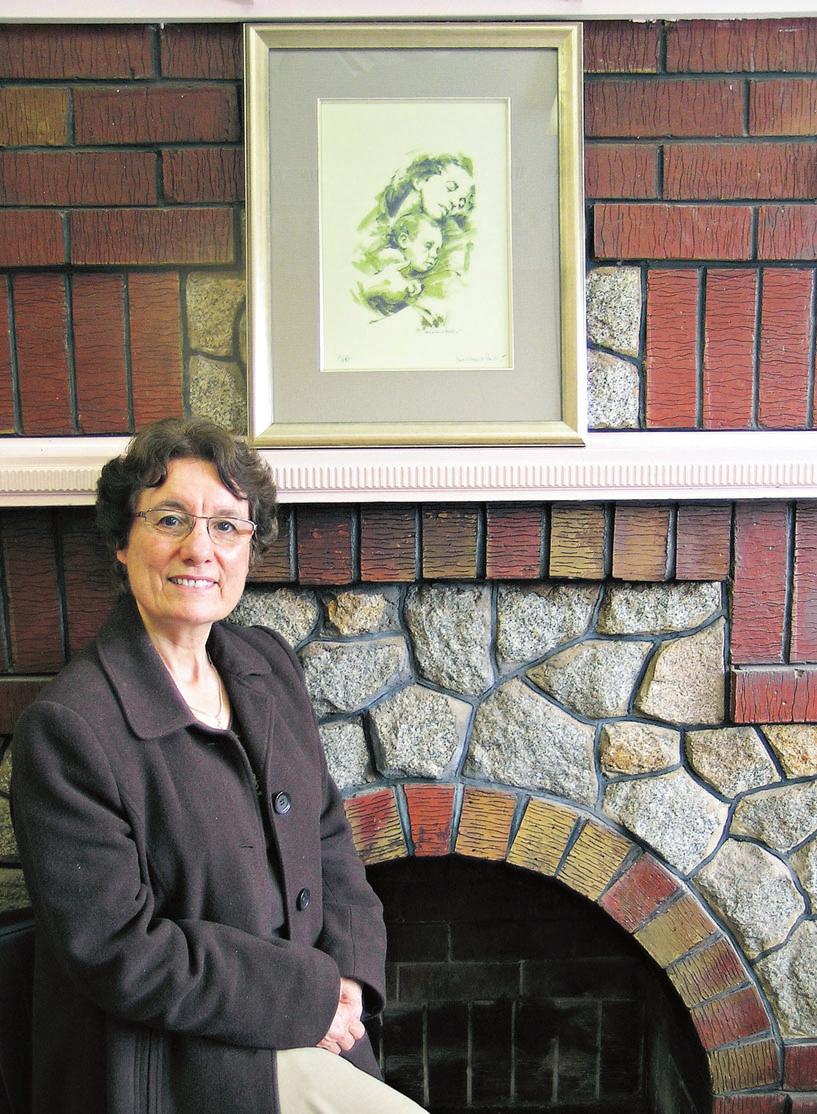 PHOTO:
PHOTO:
dren very deeply, are fearful of what another pregnancy may hold for them and for their unborn child?
What can be done to help women and families in these and in similar situations?
As a psychologist I look at each case in its own right. Above all I see each person as a unique individual, with an individual history that has imprinted on her its own marks of strengths and limitations, of opportunities and pain, of belief in a God who is love or one who is as demanding and punishing as dad was - a history that impacts on her private life as well as in her social interactions. It’s within this context that we must stand with the person who is confused about a pregnancy. My primary concern must be to allow her to tell me the story that is at the root of the anxiety, fear or resentment surrounding the possibility of giving birth.
Once the issues at stake have been aired and respectfully considered, she is then freed to make a more enlightened and more objective decision.
But even so, as Dr Fogel observed, termination often has a terrible effect on the woman. Some time ago Jane (not her real name) was referred to me because she was engaging in self harm and had been very depressed for some years.
She was married with three teenage children, but as the story unfolded, Jane told me that she had had an abortion some years ago.
Then she had tried to get on with her life, but life had slowly become drudgery. She said she could not be available to her husband or to her children because ‘they want too much of me.”
What Jane meant was that she could not give them the love or the type of presence they needed from her because she was too sad inside.
She knew that her kids were having trouble at school and with their friends, and that her husband had started to stop at the pub on his way home from work. Watching this
intense and her way of trying to ‘make it better’ was to hurt herself.
At least the pain of her selfinflicted injuries would stop her inner pain for a little while, she said.
Her past decision to terminate her pregnancy was now having a harmful effect on her husband, her children and her own future health and well-being.
We all know that abortion is always the wrong option, but once a person decides that this is the only option for her or for her family, to blame or make the person feel guilty could perpetuate that guilt over many generations, resulting in a string of dysfunctional human beings unable to experience love.
Healing through unconditional and non-judgemental counselling is a very good way to minimise the effects of an abortion.
A good psychologist can help the person to deal with their own negative feelings, so that they are then freed to love themselves again, and then extend that love to their family.
This way we not only extend God’s forgiveness and healing to the one who needs them, but we also stop the roller coaster effect of guilt and blame.
If we really want to promote life, then we must also make every effort to look after both the mother and her family.
Working closely with GP’s, obstetricians and other medical specialists, the newly founded Mamreh Counselling Service (Mamreh CS) aims to provide a holistic and comprehensive service to alleviate parental anxiety.
“Today’s prenatal genetic test information can have profound medical, psychological, ethical and social implications. People need to make genuinely free and ethically informed decisions regarding the possible pregnancy of a disabled child,” said couselling psychologist Jacqueline Jones, who has a background in nursing.
In accordance with the Catholic Church’s moral teachings and values, Mamreh CS is an initiative of St John of God Health Care and Mercy and works in conjunction with Archbishop Barry Hickey of Perth.
Of Mamreh’s Catholic origins Miss Jones said “there is a need to break down the myth that Catholics are there to coerce people. I believe the termination of a pregnancy is a serious decision, which no one ever takes lightly. It is a decision that needs to be met with the balanced and non-judgmental approach Mamreh offers.”
happening and unable to do anything about it, her feelings of guilt and isolation became even more
For further information or to discuss counselling, contact Jacqueline Jones, Counselling Psychologist, at the Mamreh Counselling Service on (08) 9444 5045.
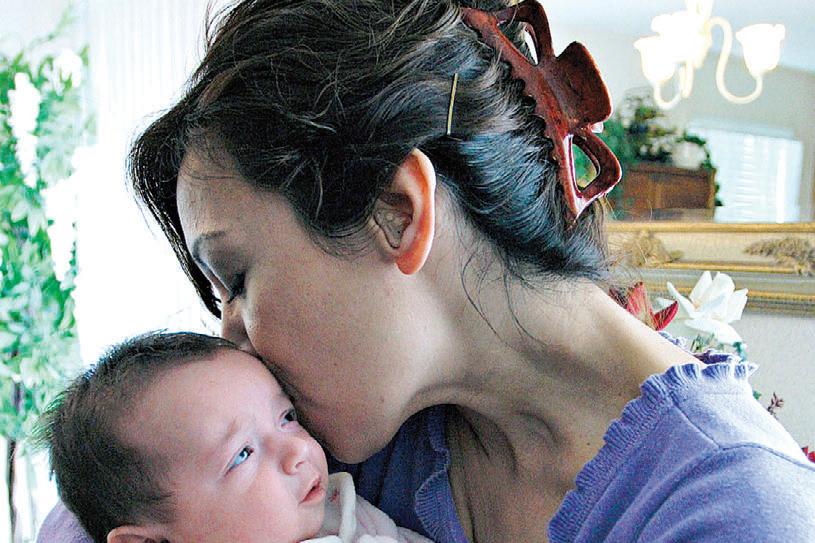
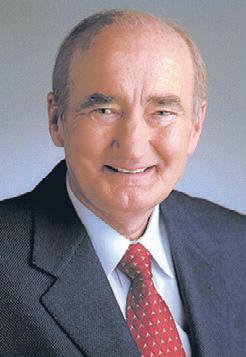
Mamreh CS assists women, men and families who are struggling with issues relating to problematic prenatal screening tests, miscarriages and pre or post termination problems such as grief, depression, relationships or simply the inability to cope with daily life.
While there are several counselling services across WA, most are either short term or crisis orientated. Mamreh, however, offers comprehensive, confidential and individualised counselling as well as assistance in directing and accessing medical, spiritual and psychological support for as long as necessary.
“Mamreh is really about providing a safe place for people to articulate their fears of conceiving a child, be it disabled or not,” Miss Jones said.
Mamreh CS operates on donation and can be found at 39 Jugan St in Glendalough. Alternatively those interested can phone 9444 5045, or email: mamreh@iinet.net.au.
Do I guarantee that when people come to do business with me, they will be treated with courtesy, sincerity, professionalism and ef ciency?
I say “I want your business and I m prepared to pay for it” and “I stand behind every car I sell”. Is that really true?
Is it true that I have over 40 technicians who are dedicated to getting my used cars in rst class condition before sale?
Is it true that every year for the last 17 consecutive years
I ve been Australia s top selling Hyundai dealer?
Is it true that if somebody buys a used car from me, I will pay for a pre-purchase RAC or similar inspection?
I have a warehouse selling cars under $10,000. Is it true that I offer a full money back guarantee within one week?
Catholics can now help form tomorrow’s world leaders of the Church
Many outstanding leaders and senior pastors are needed for the Church to carry out the demanding mission received from Our Lord.
The Church runs seminaries in many countries to educate priests but a large proportion of Church leaders come from Pontifical Universities, which are the highest training centres of the Church and form its top students intellectually, spiritually and humanly.
Karol Wojtyla, as a young priest, went from the diocese of Cracovia to Rome in 1947 to study Theology at the Pontifical University of Saint Thomas, “Angelicum.”
He became Pope John Paul II in 1978.
Another promising priest, Albino Luciani, moved to Rome from the Italian diocese of Belluno to study at the Pontifical Gregorian University.
He became Pope John Paul I in 1978.
Giovanni Battista Montini became Pope Paul VI in 1963. He had studied at the Gregorian University.
Angelo Giuseppe Roncalli and Eugenio Pacelli were both students in Rome, at the Athenaeum of St Apollinare, which was incorporated into the Pontifical Lateran University.
They obtained degrees in Theology and Canon Law. Roncalli was elected Pope in 1958 taking the name of John XXIII. Pacelli became Pope Pius XII in 1939.
From the Pontifical Universities
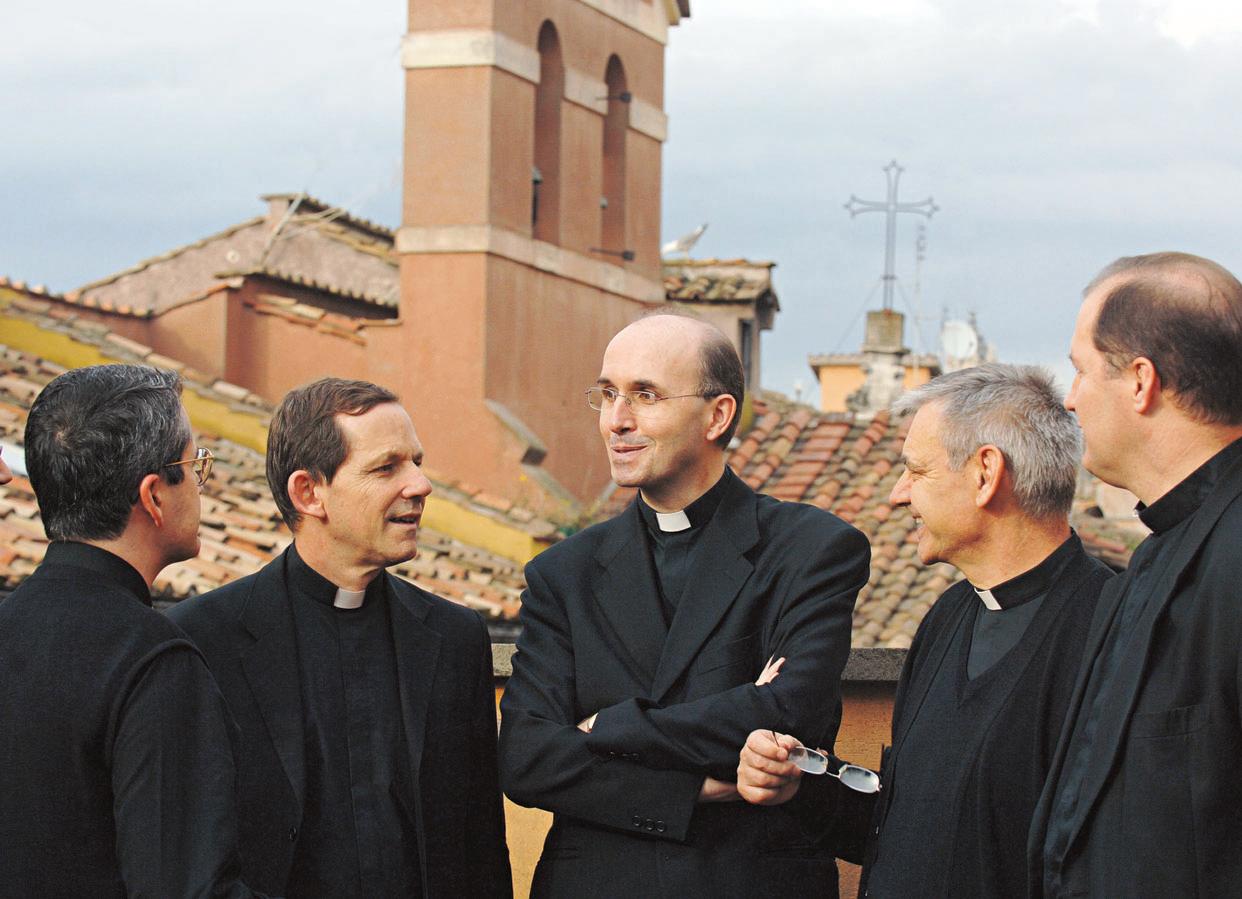
of Rome have come not only Popes, but a large percentage of Bishops, lecturers in seminaries - and holders of positions of responsibility in many dioceses throughout the world.
Cardinal George Pell and Archbishop Barry Hickey, for instance, are graduates from the Pontifical Urbanian University.
Holy Father John Paul II wrote, “The formation of future priests is considered by the Church as one of
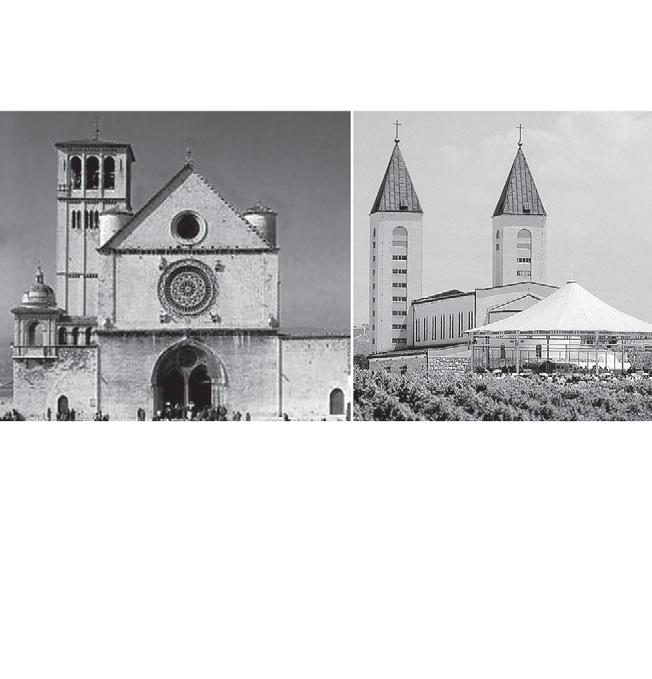

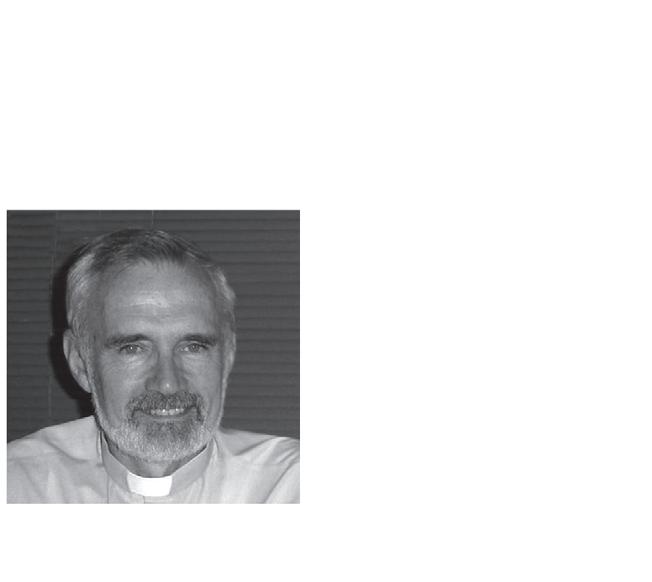
the most demanding and important tasks for the future of the evangelisation of humanity.” ….and in an address on April 27, 2004, he insisted: “Today, more than ever, the ecclesiastical universities and faculties are called to play a role in the ’great springtime’ that God is preparing for Christianity.”
Based in Rome, the Pontifical University of the Holy Cross was founded under the inspiration of St Josemaria (canonised by John Paul


In brief
11 in 2002). One of its graduates, Fr Nicholas Nweke, was ordained for the archdoicese of Perth last December in the largest ordination ceremony seen in the history of the archdiocese when nine men were ordained to the priesthood in St Mary’s Cathedral by Archbishop Hickey.
It offers four Faculties (Theology, Philosophy, Canon Law and Institutional social Communications) and an Institute
A heterosexual woman in Washington state has filed a claim with the state’s Human Rights Commission that unmarried straight people should get the same domestic partner benefits as homosexual co-workers. Earlier this year the state added sexual orientation to its anti-discrimination law. Sandi Scott-Moore says health insurance for her male partner was denied by her employer because the unmarried couple are not of the same sex. Human Rights Commissioner Marc Brenman said his office is proceeding “very, very cautiously” because of the radical policy implications. - FAMILYEDGE
Americans are top workaholics, but the British are not far behind. The UK children’s charity 4Children reports that the country has the longest working hours in Europe, with nearly one in five full-time employees working more than 48 hours a week, and the fewest number of national holidays. The charity said around 67 per cent of mothers and 90 per cent of fathers who have dependent children go to work.
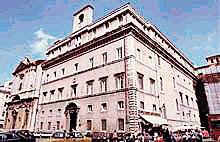
for Advanced Religious Studies.
The teaching staff consists of 140 professors and lecturers. In the last academic year 1488 students from 75 countries, including ours, were enrolled.
The Church forms a single body and in every healthy body each cell receives something from the other cells and gives something to them in return.
To run such a ‘centre of excellence’ as The Pontifical University of the Holy Cross is a very complex and costly exercise that requires the cooperation of many people.
Just as all the faithful benefit in one way or other from the work of a Pontifical University it is only just that they support its operation with their prayers and economic assistance. A special Foundation has been set up in Australia to help in this essential task of forming outstanding leaders and pastors of the Church.
Patrons of the Pontifical University of the Holy Cross Foundation include a former President of NSW’s Legislative Council, Johno Johnson, Lady Mary Lawler and Professor Ronald Woodhead.
To find out more about the Pontifical University of the Holy Cross or to support it by way of a financial contribution, the contacts are: P.O. Box 176, GORDON NSW 2072; Telephone: 0409 832 499; Email: pontiuni@optusnet.com.au
The lack of work-life balance was detrimental to children.
- FAMILYEDGE
A blind activist who exposed a campaign by Chinese officials to force women to have abortions was jailed for more than four years last week in one of the country’s most controversial human rights cases since the Tiananmen Square episode. Chen Guangcheng, a peasant who taught himself law in order to fight discrimination in his home region of Linyi, has been harassed by police since he drew attention to a forced abortion campaign in Linyi last year.
- FAMILYEDGEA high-profile economist is challenging the conclusion in the best-selling book Freakonomics by University of Chicago professor Stephen D Levitt that the legalisation of abortion in the early 1970s led to a major drop in murder and other violent crimes a generation later. John R Lott Jr, a former U of C economist now teaching at New York, says the 1973 Roe v Wade decision actu-
ally caused violent crime to rise, by prompting a cultural change that increased the number of children born out of wedlock.
- FAMILYEDGE
A world trend towards childlessness that includes even more traditional European countries such as Greece is surveyed in the latest issue of Newsweek.
From Switzerland to Singapore, Canada to South Korea, young people are postponing children until they are well into their 30s, or even 40s and beyond.
Previous eras of low fertility were usually the product of poverty or upheaval, of missing men in times of war.
Today’s trend occurs in the context of affluence and is related to “relationships”, careers, long education, lifestyle expectations, job insecurity and other factors.
British economist Catherine Hakim maintains that childlessness is not the reason for low birthrates. The real culprit is a sharp drop in family size - those who do have children are stopping at one or two. Starting families earlier is obviously part of the answer to this.
Continued from Page 1
representatives of the Catholic Church in Victoria, and of other Christian churches. A complaint against two Protestant ministers under the law by the Islamic Council of Victoria was supported by the Catholic Church in Melbourne.
In a cover article titled “Standing Up to the Islamists” in the September edition of the conservative intellectual magazine, Quadrant, Fr Stenhouse says most religions, including Catholicism, recognise and welcome frank discussion of their beliefs.Some Muslims in Australia do not, he says.
“Islamists and even some moderate Muslims refuse to allow any discussion of the message allegedly
When meeting in Munich’s cathedral with first communicants, their parents and catechists, Benedict XVI invited them to discover the beauty of family prayer.
The Pope presented Communion as the “source of life” with which Jesus “comes to us and makes each of us one with him.”
Addressing the children’s parents in particular, he said: “I ask you to help your children to grow in faith.
“I ask you to accompany them on their journey toward holy Communion.”
In a word, the Pope explained, the children must be helped “on their journey toward Jesus and with Jesus.”
“Please, go with your children to Church and take part in the Sunday Eucharistic celebration!” he implored.
“You will see this is not time lost; rather, it is the very thing that can keep your family truly united and centered.
“Sunday becomes more beautiful, the whole week becomes more beautiful, when you go to Sunday Mass together.”
“And please,” Benedict XVI urged, “pray together at home too: at meals and before going to bed. Prayer does not only bring us nearer to God but also nearer to one another.
“It is a powerful source of peace and joy.
“Family life becomes more joyful and expansive whenever God is there and his closeness is experienced in prayer.”
The Holy Father also addressed the religion teachers to urge them “to keep alive in the schools the search for God, for that God who in Jesus Christ has made himself visible to us.”
“I know that in our pluralistic world it is no easy thing to bring up the subject of faith,” he said, “But it is hardly enough for our children and young people to learn technical knowledge and skills alone, and not the criteria that give knowledge and skill their direction and meaning.
“Encourage your students not only to raise questions about particular things, but also to ask about the why and the wherefore of life as a whole.
“Help them to realie that any answers that do not finally lead to God are insufficient.” - Zenit
handed down to Muhammad by the Archangel Gabriel, and incorporated in the Qur’an, or of the prophethood of Muhammed.”
Christians and other nonMuslims have an obligation and a right to look hard at the sacred books of the Muslims “when fanatical and violent Muslims base their religious and racial violence against non-Muslims on these texts,” he says.
In the article Fr Stenhouse also calls for reappraisal of the conditions under which chairs of Islamic studies in Australian universities are funded by Islamic states.
“Could a non-Muslim competent in Arabic language and literature be eligible for such a chair?” he asks. “Could a Christian or a Jew?”
Fr Stenhouse says to his knowledge, no Islamic academic in an Australian university has yet come forward calling for openness in discussion and argument on Islamic beliefs and traditions that affect non-Muslims.
Fr Stenhouse says that while Muslims living in Australia enjoy equal legal rights with other citizens, Islamic societies on the other hand “will not tolerate this extension of equality under the law to non-Muslims.”
He says that the “tolerance” allegedly enjoyed by non-Muslim minorities in Spain between AD 711 and 1492 is “an urban myth along the lines of alligators in the New York sewers.”
Saudi Arabia today, he says, “will
not even extend citizenship to foreign Muslims who work to keep its petro-dollars and euros flowing.”
Fr Stenhouse blames the Saudi Arabian promotion of the Wahhabist version of Islam for much of the threat to peace and stability in nonMuslims societies today.
He says the “virus” of Wahhabist ideology is promoted worldwide using the annual pilgrimage to the Haj, the holy places of Mecca and Medina which lie in Saudi Arabia.
Saudi Arabian religious police have stamped out all alternative versions and practices of Islam within their borders and will not allow Muslim visitors to pray at holy Islamic sites of which the Wahhabists disapprove, Fr Stenhouse says.
“The extremist Wahhabis con-
tinue to use Islam as a lever to peddle their particular form of Arabism - what Western fellow travellers would call their ‘culture’,” Fr Stenhouse writes.
Fr Stenhouse says that Western policy since September 11, 2001 has also been mistaken.
He says the invasion of Iraq and US support for Israel’s attack on Lebanon were tragic tactical errors.
“Imposing ‘democracy’ on countries unwilling to accept it, or unprepared for it, in order to bring a region vital to the West’s economies under ‘control’ by the West or its surrogates, all in the name of helping the peoples of the region to fulfil their destiny, is at best a pipe-dream and at worst a nightmarish scenario that must eventually backfire.”
Sharing in a true devotion to Our Blessed Mother Mary was at the forefront of celebrations at Holy Cross Church in Hamilton Hill, where the Portuguese community gathered to honour Mary’s nativity.
The brightly coloured Church was filled on Sunday September 10 with the sound of Portuguese hymns, while parishioners joined chaplain to the Portuguese community, Fr Julian Carrasco, Franciscan Friar Fr Andrea and Frs Douglas Rowe and Joe Cardoso for the bilingual celebration. A solemn high Mass was celebrated at 11.30am and was followed by a procession on the streets of Hamilton Hill and benediction.
Parishioners joined in the recitation of the rosary in Portuguese, as they marched amongst religious banners, the Salvation Army Band and the statue of Our Lady, while processing through the streets. In his homily, Fr Rowe explored what it meant to be truly devoted to Our Blessed Mother.
He said that one of the sure signs that someone was a Catholic was their belief and devotion to Mary, the mother of God – without which one could scarcely call themselves Catholic. To truly be devoted to Mary, we must wish to imitate her virtues, said Fr Rowe, adding that a true devotion to Mary goes far beyond cenacles, pilgrimages, rosaries and hymns.
“Mary was not a worldly person, neither should we strive to be of this world. God was at the centre of Mary’s life and He should forever be at the centre of ours.
“When we pray to Mary we should always ask her to grant us something of her love for God the father,” he said.
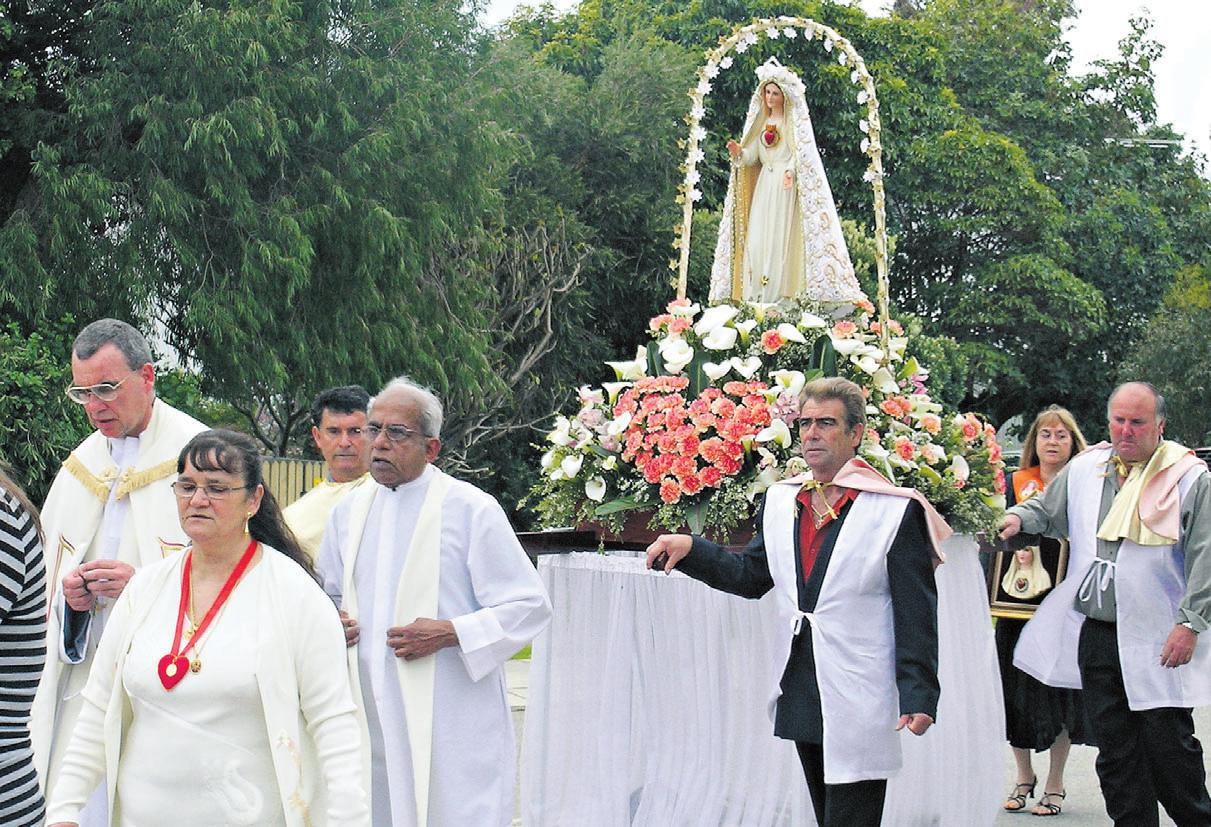
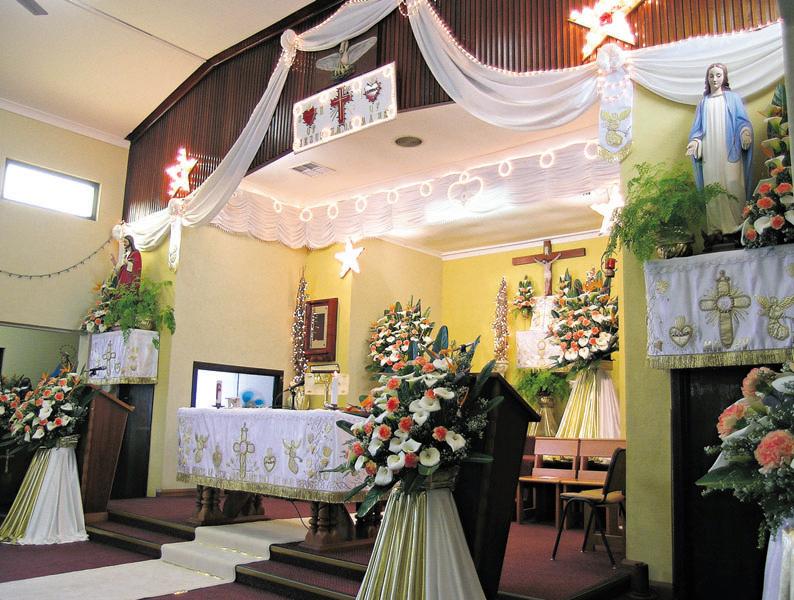
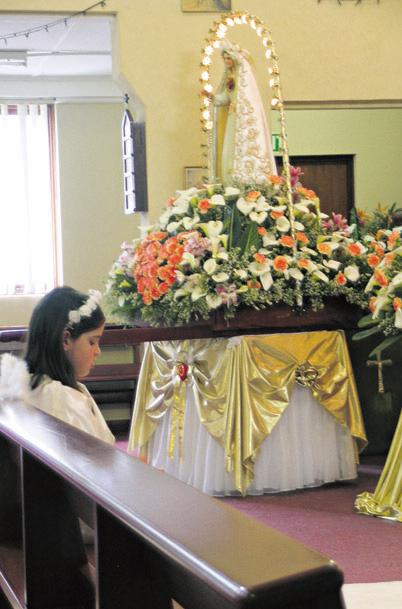
Medical students experience the remote areas of the north to gain an understanding of remote health issues.
■By
Sherrilee KingstonMedical students from the University of Notre Dame, Fremantle Campus recently spent 16 days visiting communities in the Kimberley and Pilbara learning about the medical needs of the remote communities.
The aim of the trip was for students to interact with local communities and health professionals to gain a deeper understanding of remote health issues. The school of medicine graduate program exposes students to rural and remote medicine to encourage them to consider a career in the field.
The students were billeted to pastoral stations, Aboriginal communities and town based organisations to help with the daily tasks.
Medicine student Katrina Heggie said, “Mt Pierre is incredible; everyone in the community is so welcoming. It was great for us to experience Aboriginal culture and station life at the same time; it was a pretty unique opportunity. I would love to go up again to work.”
At the end of the trip the students had to hold a debate on the topic: Taking medical students to Aboriginal communities is ‘medical tourism’ and of no benefit to the communities. The negative
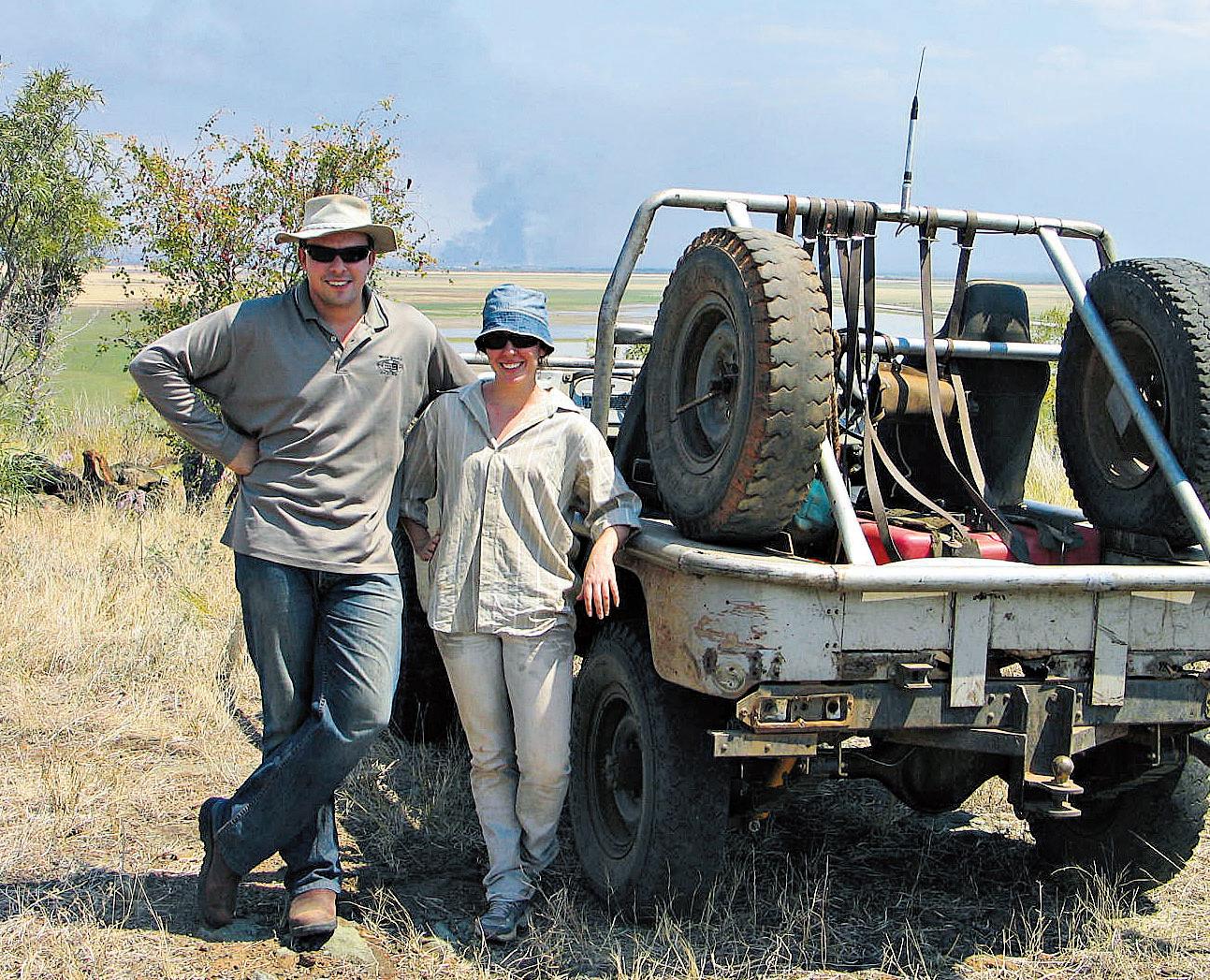
team won the debate arguing that their visit to the Aboriginal communities taught them things you cannot learn in a text book and gave them a better understanding of Aboriginal culture and health care needs.
The debate was judged by Dr Neale Fong, Director General
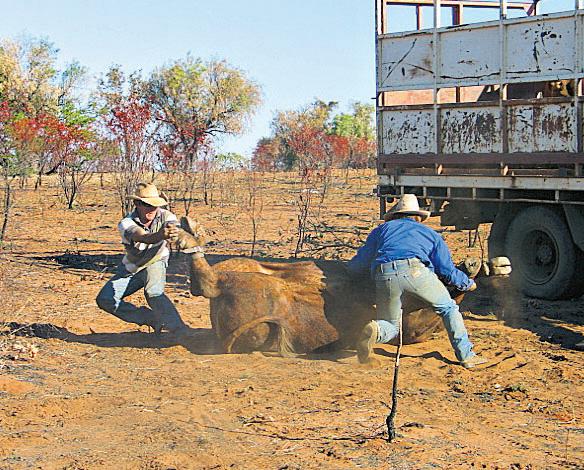
for Health in Western Australia, Professor Con Michael, Chair of the Medical Board of WA and Chair of the External Advisory Board for Notre Dame’s School of Medicine and Mayor of Fremantle, Mr Peter Tagliaferri. Mrs Ruth Webb-Smith, Vice-President of the Pastoralists and Graziers Association and bil-
let organiser also attended. “The debate showed me that the students really experienced what we wanted them to. They realise they have had a life-time experience. I now think taking them to the Kimberly will have long term benefits to medicine in the North,” said Mrs Webb-Smith.

The World Apostolate of Fatima hopes to send a billion prayers to heaven on October 8.
The occasion is a worldwide prayer day for the Sanctity of Human Life in which all Catholics are being asked to pray the rosary, and non-Catholics are invited to pray for 20 minutes, creating a worldwide current of prayer.
According to the organisers, the primary objective of the congress is to respond to Pope John Paul II’s insistence in Evangelium Vitae that “a great prayer for life is urgent, which will embrace the whole world.”
A congress will be held prior to the day of prayer in Fatima from October 4-8, with the theme: “Mary, to You We Entrust the Cause of Life.”
The Fatima congress is being organised by the namesake World Apostolate, Human Life International, Helpers of God’s Precious Infants, and Europaische Arzteaktion (European Doctors).
The event is supported by the Pontifical Council for the Family.
Those attending include Bishop Karl Romer, secretary of the Pontifical Council for the Family; Sister Virginia Beretta, sister of St Gianna Beretta Molla; and Américo Lopez Ortiz, president of the Worldwide Fatima Apostolate.
On October 6, the World Apostolate of Fatima will hold a spiritual program for all children of the world, encouraging them to gather before the Blessed Sacrament.
Continued from Page 2
the breakfast was Mr John Barich of the Australian Family Association. Mr Barich spoke on the role of fatherhood in the family and the issues confronting families in the modern society. Following the success of the men’s breakfast, a similar event is being planned for the women of the parish in the near future and will be called ‘Wine for Women’.
Five priests and seminarians, including past members of the Society of St Pius X, founded by Archbishop Marcel Lefebvre, have returned to full communion with the Catholic Church.
They founded the Good Shepherd Institute, a new society of apostolic life of pontifical right, established last Friday in Rome. Its members are people who wish to celebrate the liturgy exactly as was in force in the Latin Church until 1962.
The institute brings together priests who wish to “exercise their priesthood in the doctrinal and liturgical Tradition of the Holy Roman Catholic Church,” explained Cardinal Jean-Pierre Ricard, archbishop of Bordeaux, in a communiqué. The new institute is located in his Archdiocese.
In the apostolic letter “Ecclesia Dei,” Pope John Paul II said that
the “unlawful” ordination of four bishops within the Society by Archbishop Lefebvre, on June 30, 1988, was a schismatic act.
That ordination cut short the attempt for an agreement between the Holy See and the Society of St Pius X, carried out in John Paul II’s name by Cardinal Joseph Ratzinger, then prefect of the Congregation for the Doctrine of the Faith.
Archbishop Lefebvre died in March 1991 and was succeeded by one of the ordained bishops, Bernard Fellay, in the leadership of the group.
In his communiqué Cardinal Ricard said: “Since the beginning of his pontificate, Pope Benedict XVI has expressed his concern for a return to full communion by those who followed Archbishop Lefebvre and wished to offer welcome gestures.”
Cardinal Ricard, 61, who is also president of the bishops’ conference of France, explained that “the Pope himself made the decision to establish this new institute. In this decision there is the will to propose an experience of reconciliation and communion that will have to be affirmed and deepened with deeds. For this reason, the statutes of this institute are approved ‘ad experimentum’ for a five-year period.”
“We share profoundly this concern of the Pope for reconciliation and communion and we welcome filially his decision,” stated the cardinal, who is also a member of the Pontifical Commission “Ecclesia Dei.”
That commission was established by John Paul II to facilitate the full ecclesial communion of the priests, seminarians, communities and men and women religious connected
in some way to Lefebvre’s group, who wish to remain united to the Successor of Peter in the Catholic Church, keeping their spiritual and liturgical traditions.
The Archbishop of Bordeaux said that a “convention” will be agreed to by the institute and the archdiocese on how the former will operate.
The cardinal acknowledged that what is needed is a “whole endeavour of pacification, reconciliation and communion, as violence has characterised the relations even over the last months of several members of that institute with the diocesan Church. Each one will have to contribute his part.”
In 2002, Cardinal Ricard asked the municipality of Bordeaux to discontinue assigning a priest of the then unapproved institute to the Church of St Eloy in that city. The cardinal’s request drew much
media attention. Bishop Fellay, head of the Society of St Pius X, issued a communiqué expressing opposition to the agreement reached by the institute as he believes it is “a communal solution in which the Tridentine Mass would be confined in a particular statute.”
Other followers of Lefebvre are already reconciled with Rome, as is the case of the personal apostolic administration “St John Mary Vianney” of Campos, Brazil, which arose from a group led by Bishop Licinio Rangel. He was consecrated by three bishops ordained illicitly by Lefebvre.
Their return to the Catholic Church took place on January 18, 2002, in a solemn ceremony presided over by Cardinal Darío Castrillón Hoyos, president of the “Ecclesia Dei” Commission.
Artist Igor Babailov, a Russian native, says his goal is to project Pope Benedict’s truth and beauty through a realistic portrait.
■ By Theresa LaurenceLooking out the front picture window of his home, Igor Babailov takes in the sweeping view of the rolling green hills below.
“The best artist in the world is God; look at this beauty,” he said. “The design of all this is total harmony.”
Babailov, a Russian native and Tennessee resident who has been commissioned to paint a portrait of Pope Benedict XVI, said his goal is to project truth and beauty through his realist paintings.
“Art should carry a strong message beyond just pretty pictures,” he said.
“Without a message, art is no more than a candy wrap; there’s plenty of candy wrap all over the place.”
To capture the essence of his subjects, Babailov will spend up to a year completing a portrait.
With a few rare exceptions, Babailov insists upon an in-person sitting with his subject, where he will draw pencil sketches and take photographs for reference.
In his studio, he will complete a series of compositional studies before starting the final oil painting.
On his Web site, www.babailov. com, Babailov writes, “Just like the masters of the past, I don’t believe in shortcuts, especially in portraiture, as it is a form of art which
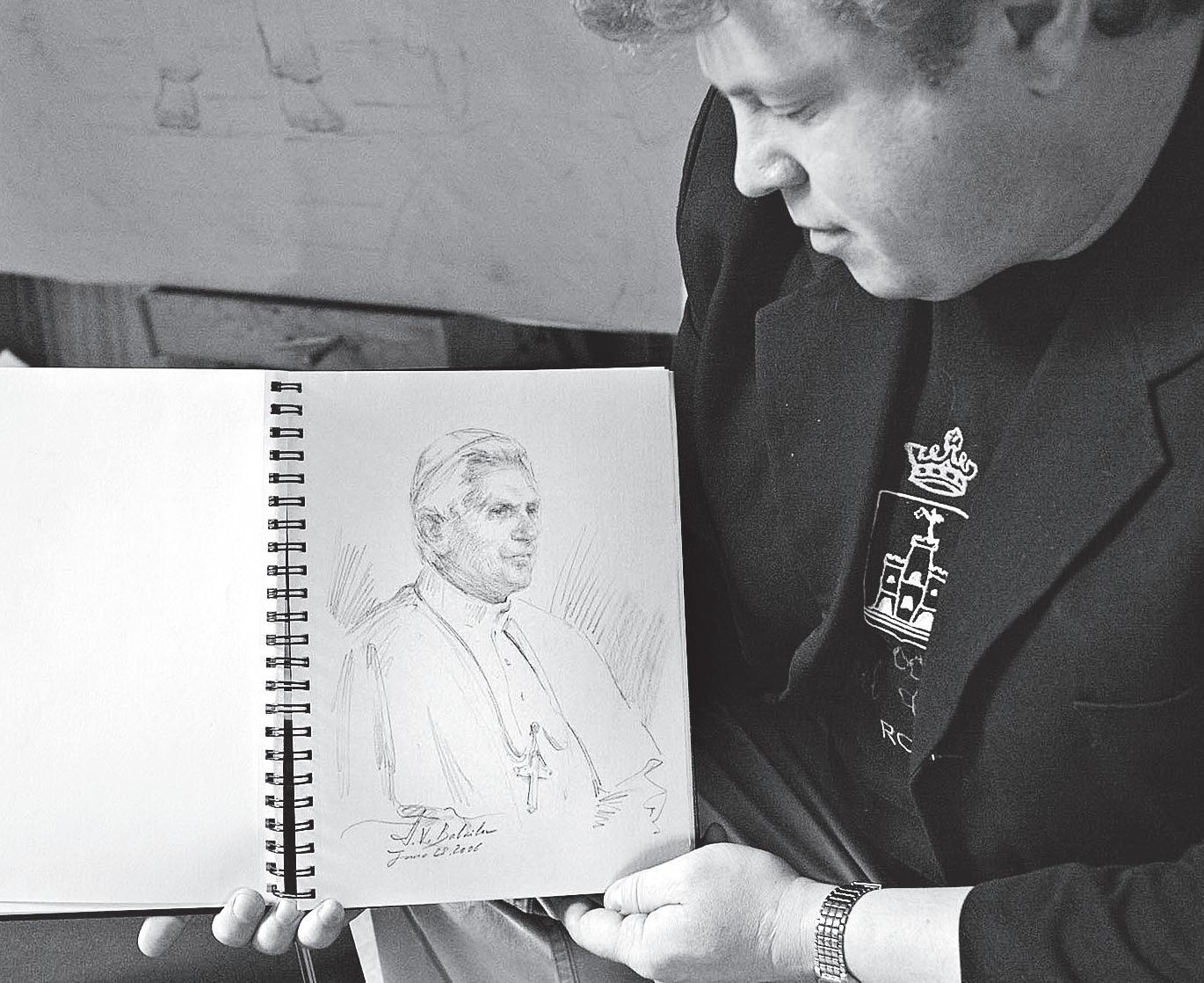
represents the highest form of the creation, us.”
Babailov saw Pope Benedict in June to begin the portrait process. The sitting, he said, was not a oneon-one meeting. Rather, Babailov sketched Pope Benedict at one of his weekly audiences in St Peter’s Square, with thousands of people watching.
Babailov’s audience with Pope Benedict, however, was not the first
time he met a pope. The artist was also commissioned by the Vatican to paint a portrait of Pope John Paul II on the 25th anniversary of his pontificate.
When Babailov visited Rome this summer he was happy to see that his painting “is not in the archives collecting dust,” but prominently displayed at Castel Gandolfo, the pope’s summer residence.
“It is a really great honour,”
Seminarians from as far as Papua New Guinea expressed their interest in this year’s 48-hour perpetual rosary bouquet, which ended at 6pm on September 7.
Fifty parishes, various schools and numerous individuals participated in the 2006 rosary bouquet, which covered most of Western Australia and had participants in Queensland, Victoria, New Zealand, Singapore and Papua New Guinea.
Some schools even stopped for their allocated hour to recite the rosary as a whole school.
“This is the 18th year that WA has been responsible for 48 hours of continual rosaries, free of intentions, as a birthday gift to Our Lady,” said chief organiser Margaret Bowen.
“Because the rosary can be said anywhere, elderly people who are house-bound and couldn’t normally participate can be part of the Catholic community’s gift to Our Lady,” she said.
The names of all those who participated in the rosary bouquet were recorded on a scroll, which was presented to Our Blessed Mother during her birthday Mass at St Joachim’s Pro-Cathedral, in Victoria Park, on September 8.
During the homily, celebrant Fr Paul Carey extended his sincere thanks to the WA community for taking part in the bouquet, adding
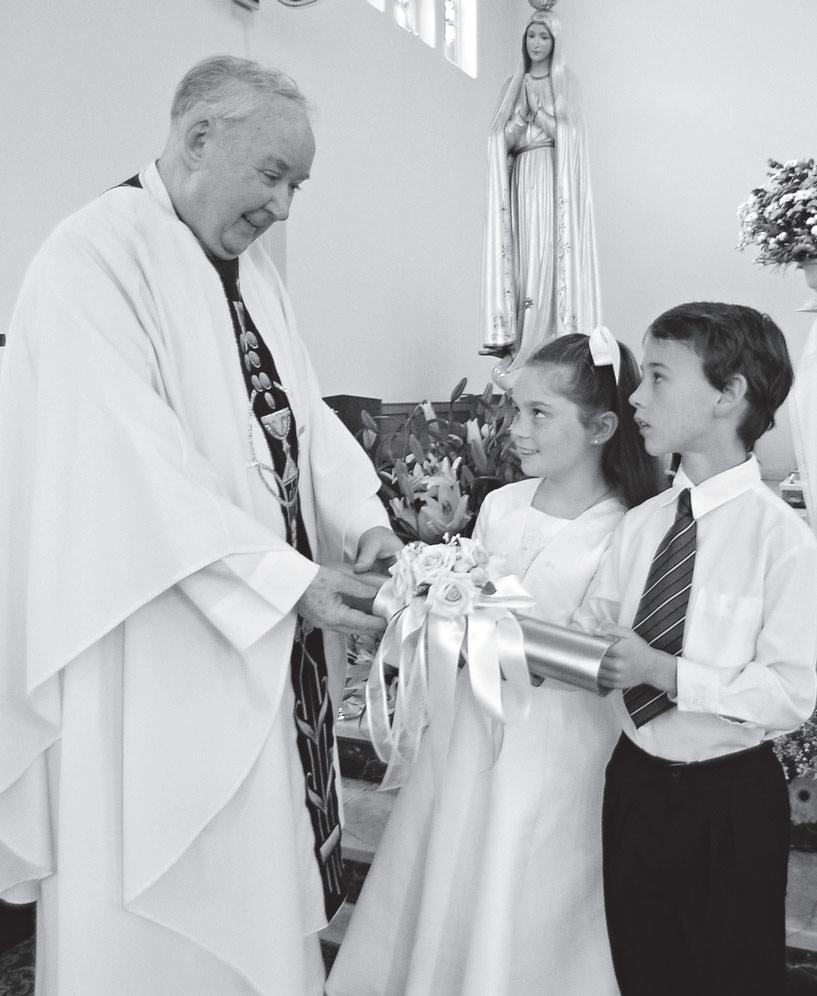
that there was such a great love for Mary in WA. “Today we honour Mary, whom we have been called to imitate by constantly striving for a life filled with grace in the Trinity,”
Fr Carey said. Mrs Bowen also thanked the people of WA and all others who joined in the bouquet so that “this very special birthday gift could be given to
highlight his “well-known quality of being an educator,” Babailov said.
Babailov’s portrait of Pope Benedict is sponsored by Ave Maria University in Naples, Florida While details of the sponsorship are still being discussed, Babailov will likely unveil the portrait on campus before presenting it to the Pope, and will also paint a duplicate copy to be displayed on Ave Maria’s campus.
The sponsorship from Ave Maria University will help cover Babailov’s basic expenses, but according to his wife Mary, “it’s not about money ... you don’t get paid to paint the pope.” The couple hopes the sponsorship will also draw attention to the new Catholic university.
While Babailov has painted some prominent world leaders, including President George W. Bush, Russian President Vladimir Putin and former South African President Nelson Mandela, as well as politicians and film and sports stars, he says that one of the joys of his work is “to meet the people, not just presidents and popes.”
The people he paints who are unknown to the general public “are not less interesting or less important,” he said.
A current painting on the easel of his home studio is dedicated to the victims of world terrorism and is titled “Who has to suffer and why?”
Babailov told the Tennessee Register, diocesan newspaper of Nashville.
The artist envisions that the portrait of Pope Benedict will have some of the same themes as the painting of Pope John Paul II, since they were so close.
The portrait of Pope John Paul shows him surrounded by young people, in honour of World Youth Day.
Pope Benedict’s portrait will also
The distracting power of television can be a boon to children undergoing painful medical procedures, an Italian study has shown.
But the results are also disturbing because they showed that cartoons were even more comforting to the kids than their mother’s attention. Lead author Dr Carlo Bellieni, a father of three and a neonatologist and paediatrician at the University of Siena, said the study demonstrated “the excessive power of television”.
The study involved 69 children aged 7 to 12 who were separated into three groups and then asked to rate their pain when jabbed with a needle used to take a blood sample. The children’s mothers also rated the pain.
Those watching TV cartoons reported half the pain of those being soothed by their mothers, and one-third the pain of those who just sat in a hospital room with mothers who didn’t try to comfort them.
“The power of television is strong and it can be harmful for children if it is stronger than the force made by the mother to distract children,” Dr Bellieni said. “I believe that this power must be controlled and reduced.”
A member of the Russian Orthodox Church, Babailov says he relates closely to the Catholic faith.
Both share Christian values, strong support of the traditional family and the commitment to “constantly work to improve yourself,” he said.
“To teach the right values is the most important lesson of all faiths,” Babailov said. And “visual art is one of the most powerful tools to teach values.” CNS
Ninety per cent of parents or guardians of children aged 8 to 18 believe they should bear a lot of responsibility for ensuring that children are safe online, a new United States poll shows.
However, only 34 per cent see themselves as “very knowledgeable” about how to educate their kids to use the Internet safely and responsibly, and 71 per cent think schools should carry a major part of responsibility for children’s safety. The poll was carried out by Harris Interactive for Cable in the Classroom. Other results include:
The vast majority of parents (94 per cent) have taken steps to ensure their children’s safety:
● talking to them about how to use the Internet;
● monitoring online activities; keeping home Internet use to the living room or open spaces;
● setting time limits (74 per cent);
● and installing software to control access (55 per cent).
Only about half of parents (49 per cent) think that government and law enforcement agencies should have a lot of responsibility in this area.
It was an interesting day, September 11. There were the Americans and their friends, such as ourselves, remembering the day in 2001 that two huge passenger jets were flown into the Twin Towers, a third was crashed on the Pentagon, and a fourth crashed to the ground. The main topic of conversation was the success or otherwise of the “war on terror” that had been declared as a response to these ghastly acts of terrorism. War is the greatest source of terror for most people, but five years later there still does not seem to be any general sense of the absurdity of the expression ‘war on terror’.
Halfway round the world on the same day, Archbishop Oswald Gracias, Chairman of the Catholic Bishops Conference of India, led Indian Catholics in a centenary celebration of Satyagraha - Mahatma Gandhi’s principle of non-violent resistance and refusal to cooperate with the British in their continued subjugation of the Indian people.
It was launched on September 11, 1906, and has now been taken up by the Catholic Church in India as a call to action internally and internationally to overcome injustice and the divisions caused by wars and terrorism.
And on the same day in Munich Cathedral, Pope Benedict XVI was talking to first communicants, their parents and their teachers.
He told them that if they wanted to have ‘life in abundance’ and to live in a reconciled world in which ‘every nation, race, people and tongue have come together in joy’, they must dwell in the House of the Lord.
It is generally understood that we are most likely to bring about what we believe and commit ourselves to.
These three more or less simultaneous events around the world on September 11 present neat summaries of the thought patterns which, in various forms, tend to dominate our world.
The atheistic secular humanist philosophies which dominated so much of 19th and 20th Century academic and political life could be summarised in the words of one of them, the Frenchman Jean Paul Sartre: ‘When man has completely removed God from his heart, then he will be truly free, free to do whatever he wants.’
PO Box 75, Leederville, WA 6902
Tel: (08) 9227 7080, Fax: (08) 9227 7087 cathrec@iinet.net.au
Yes, indeed, he will even be free to fly aeroplanes into tall buildings, to walk onto a crowded bus and blow himself up and everybody else with him, and to park massive car bombs at the markets to kill the mothers buying food for the infants in their arms and the children at their feet.
These are but the latest versions of the fruits of such philosophies as previously seen in various parts of the world under Nazism and Communism.
Sadly, our own tendency to respond with war – on terror, on Afghanistan, Iraq, Lebanon – shows little advance in the quality of our thinking.
In fairness to the Americans, no one has ever been so generous to people they have fought as the Americans have been, and will continue to be, but it remains tragically true that we are very slow to learn that fighting is not a productive way to reconcile the world.
“Yes, indeed, he will even be free to fly aeroplanes into tall buildings, to walk onto a crowded bus and blow himself up and everybody else with him, and to park massive car bombs at the markets to kill the mothers buying food for the infants in their arms and the children at their feet.”
Mahatma Gandhi’s non-violence is a considerable advance. It moves beyond the belief in violence as the solution to our problems and declares that mankind has greater strength in his mind and spirit.
As Archbishop Gracias said of Gandhi on September 11, “He had a huge following because people of every faith, caste and creed witnessed his spiritual strength, not to mention his political action.”
It is a much better way to reconcile the world. Sadly, it too has the limitation that it can be used by people to support the causes of self, so that those of other views can be swamped by an insistent demand to conform.
In Munich, the Pope’s message to the children, their parents and their teachers was ‘drink directly from the source of life’, God himself; not a distant or unknowable God, but a God who became one of us, who pitched his tent among us, and who shelters us in his tent.
The true source of life is Jesus himself, who gave us his very self, and continues to do so in Baptism, cleansing us so that we are capable of living in God’s company, and the Eucharist, the food that sustains us on our spiritual journey.
To be able to live in the kingdom of God, however, requires us to give up our false faiths – faith in violence or faith in non-violence on condition that it supports my objectives.
The kingdom of God is the kingdom of love. To live in it requires us to live in love – self-giving, life-giving love. The great mystery to the human mind is the notion that we can only achieve freedom by surrender.
Jesus told us that if we cling to our own life, we will lose it, but if we surrender our self to him, then we will discover who we truly are. We fear to take on the life of God fully because it seems like a denial, even an annihiliation, of who we are.
But it is only in the kingdom of God that we discover who we truly are. The only complete image of this transformation is Jesus dying on the cross and revealing the freedom of the resurrection.
Mr Ted Watt’s letter (‘Report was correct’ August 24, 2006) mistakenly asserts that Archbishop Pietro Sambi, apostolic nuncio to the United States, and the new archbishop of Washington DC provided Catholic Senators John Kerry and Edward Kennedy with a “valuable photo opportunity just before the election” and that the two archbishops “conveyed to hundreds of politicians and millions of voters the message: Killing unborn people, and legalising that killing, is no big deal.”
The archbishops did no such thing. During the election, no such photo opportunity was sought or given. The US presidential election took place in November 2004. The Mass for the installation of the new archbishop of Washington DC took place in June 2006. It is customary to invite Catholic politicians to such a Mass. It would be a further politicisation of the Eucharist not to invite them, not to welcome them, and not to offer them the bread of life should they approach the altar.
Three steps to attaining real friendship with God:
Step one: Use your willpower. Force yourself to give up all bad actions and every self-indulgence.
Step two: Now stop using your will power.
Say to God, “Lord, I’ve gone as far as I can go in my own strength. Overcome my every least sinful thought with your love.”
Remember Saint Paul’s words, “No longer do I live, but Christ lives in me.”
Step three: Never again judge another person.
You can judge that something a person does is wrong.
But never judge the person himself. Leave that to God.
Think, instead, about why God let that thing happen.
What was he trying to teach you?
Nothing happens without God’s permission.
Dr Arnold Jago Mildura VIC
Frank Brennan defends himself (August 24, letters) by saying that he thinks proabortion politicians should be allowed communion.
Not to so allow is a matter of punishing and “coercing” them.
Not at all. It is simply that a priest may not give communion to someone in mortal sin, as such a politican would be.
Nothing personal, just Church law and priests have no choice in the matter.
Reject that law and you indeed reject the Church, in spite of Fr Brennan’s indignant prose.
Peter Gilet AlbanyPrime Minister Howard is calling for Muslims to treat women according to Australian values.
He needs to qualify what he means by “Australian values.”
Surely this does not include treating women as disposable sex objects as per so many popular magazines, songs and video clips that are so much part of our Australian “culture” ?
Jerome Gonzalez WillettonMr Watt’s criticisms of the two prelates is, on this occasion, unfounded. Whatever our differences, let’s start with the facts.
Fr Frank Brennan SJ St Mary’s, North Sydney
With due respect to Father Frank Brennan (The Record August 24 ) on the subject of John Kerry’s reception of the Eucharist, I am struggling with Father’s logic.
A prominent Catholic, sometime candidate for the US Presidency, proclaims openly that he is ‘pro-choice’. He publicly presents himself for Holy Communion while patently not ‘in communion’ with the Church on this vital moral issue.
If Kerry is denied Holy Communion surely it is not we who are “politicising the Eucharist,” as Father Brennan says, but Kerry himself?
Is it not the political challenge to the Church, by a populist outof -step Catholic politician, which is the issue here? Has not Kerry’s conscience been properly informed by now ?
The scandal involved is yet another aspect...
Maria O’Connor KalamundaLike the concerned worshippers who shared their disappointment at the impending departure of the Scalabrinian’s (Record, August 7), we too would like to share with the Catholic community the great sadness and concern the Italian speaking community of St Joachim’s Victoria Park feel after 30 years of having an Italian Mass.
The Sunday Mass was cancelled approximately six weeks ago despite our being given assurances by the Archdiocese that it would remain.
In the weeks leading to the closure, a representative from the Archdiocese advised that the reason for the closure of the 8am Italian Mass was that no Italianspeaking priest was available.
We were also told that it was a great honour for St Joachim’s to be chosen as the interim Cathedral and that 3 English Masses would be held each Sunday.
It made many of us wonder whether the decision had anything to do with the availability of an Italian-speaking priest.
The Italian community has always supported the parish and Italian migration has contributed to the growth and development of the Church in Australia.
We ask that the Archdiocese seriously reconsider the matter and try to come to an amicable solution.
If evidence was needed to expose the shallow and dubious reasoning of a number of our political class, the stem cell debate is making it manifestly obvious now.
Senators Natasha Stott Despoja and Kay Patterson are both proposing to introduce Bills to overturn the current ban on research into embryonic stem cells and cloning.
However, there is increasing evidence that embryonic stem cell research and cloning are not only immoral, but a waste of time, money and research.
Even the New York Times, a consistent supporter of embryo experimentation, is admitting as much.
In the 20th July edition of the Australian, Monique Baldwin, a major researcher in neuroscience said, “To date embryonic stem cells have not demonstrated any therapeutic benefit to anyone. Compare this with the 45,000 patients who benefit from adult stem cell transplants every year.”
One can only wonder why Senators Despoja and Patterson continue with their obsessive campaign to champion what is rapidly becoming a discredited and ultimately futile technique.
Could it possibly be as Dr David van Gend, spokesman for DO NO HARM: Australians for Ethical Medical Research, says, that the real motivation of the cloning lobby is more cultural than scientific and the ESC scientists refuse to accept moral limitations on their activities?
Barry Morgan SamsonA new book may just help dispel the despair that news of HIV-AIDS can bring
Even in death, beauty exists, says a book on AIDS presented at the annual Meeting of Friendship Among Peoples in Rimini, Italy.
Rodolfo Casadei, author of Gli Occhi di Irene (Irene’s Eyes), published in Italian by Guerini and Associates, presented his book at the Rimini Meeting on August 25.
The annual meeting is organised by the movement Communion and Liberation.
Written in collaboration with the Association of Volunteers for International Service (AVSI), Medicine and Person and the weekly magazine Tempi, the book addresses the preventive work, cure and fight against AIDS of the Italian-based AVSI in countries such as Uganda, Nigeria, Rwanda and Rumania.
Some eight other specialists contributed to the book: Arturo Alberti, Cristoph Benn, Paolo Bonfanti, Filippo Ciantia, Valentina Frigerio, Edward Green, Allison Herling and Giuliano Rizzardini.
The title is taken from the story of Irene, a Ugandan woman abandoned by her family and friends after discovering that she was seropositive, said Casadei.
She rediscovered hope and the desire to live after meeting a group of AVSI collaborators.
“Since that day, Irene’s face has shone again with her original beauty,” says her husband Elly.
“Through my wife’s face, I discovered that “beauty still existed” and that for someone who suffers from AIDS as she does “the only way to be happy is to have a friend who makes you look up to heaven,” adds Elly.
Casadei said the book offers “a different look on the illness.”
“When one is ill,” he said, “the experience of the person changes. One is conscious of one’s finitude, not as a lack of power but as a realisation of what one is as man. And this is the condition for a genuine search of the infinite.”
Casadei continued: “The sick have the experience of discovering their great humanity, because one loses something in the body but discovers moral energies one didn’t know one had.
“In some sense there is a loss of power but there is a discovery of oneself and of other potentialities that one uses in life. And, more important than all the experiences, is the event of an encounter of love with other people.”
The book tells dozens of stories of patients who were helped to transform their lives.
Casadei, who travelled to Nigeria and Romania to speak with patients and doctors, says he is especially impressed by Mary’s story in Nigeria.
There is an AVSI day-clinic on the outskirts of Lagos - St Kizito Clinic - which carries out a series of activities to combat AIDS.
The centre’s adviser, Mary, has AIDS, which she discovered a few years ago. Her husband, who worked in a
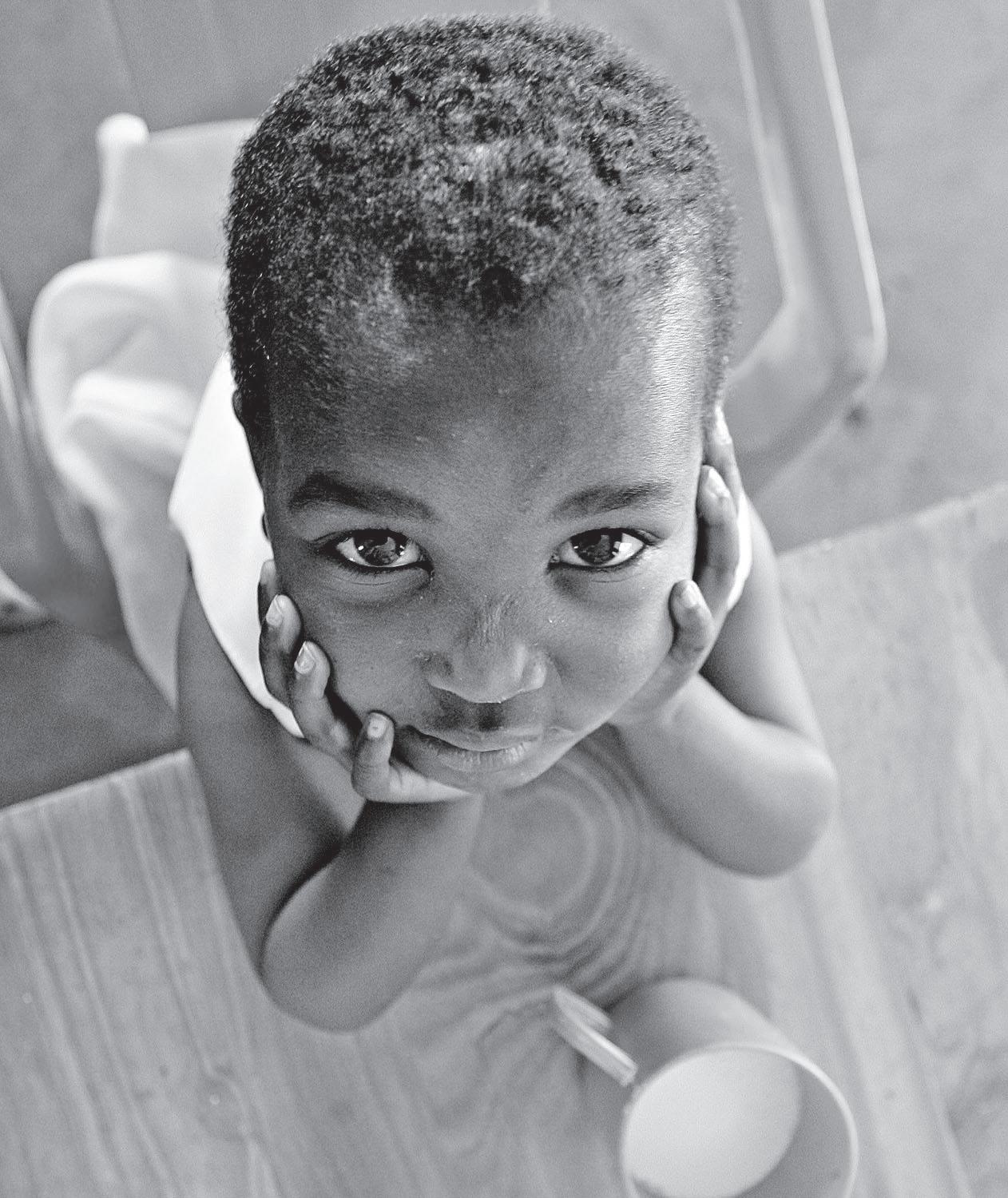
Living with HIV: a girl with a glass of milk sits at Nyumbani home in Nairobi, Kenya, on December 13. The home, run by Jesuit Father Angelo D’Agostino, was caring for 94 HIVpositive children in late 2004. Some 1.9 million children under 15 were
living with HIV/AIDS in sub-Saharan Africa, according to the State of the World’s Children report by UNICEF. Also, at Nyumbani orphanage in Nairobi, Kenya, children now live to reach adulthood with the help of antiretroviral drugs. In the 1990s
the orphanage was burying young children - three a month - in its own cemetery. Girls are pictured during choir practice at Nyumbani in May.
Photos: above: CNS/Reuters, below: CNS/Michael Swan,/The Catholic Register
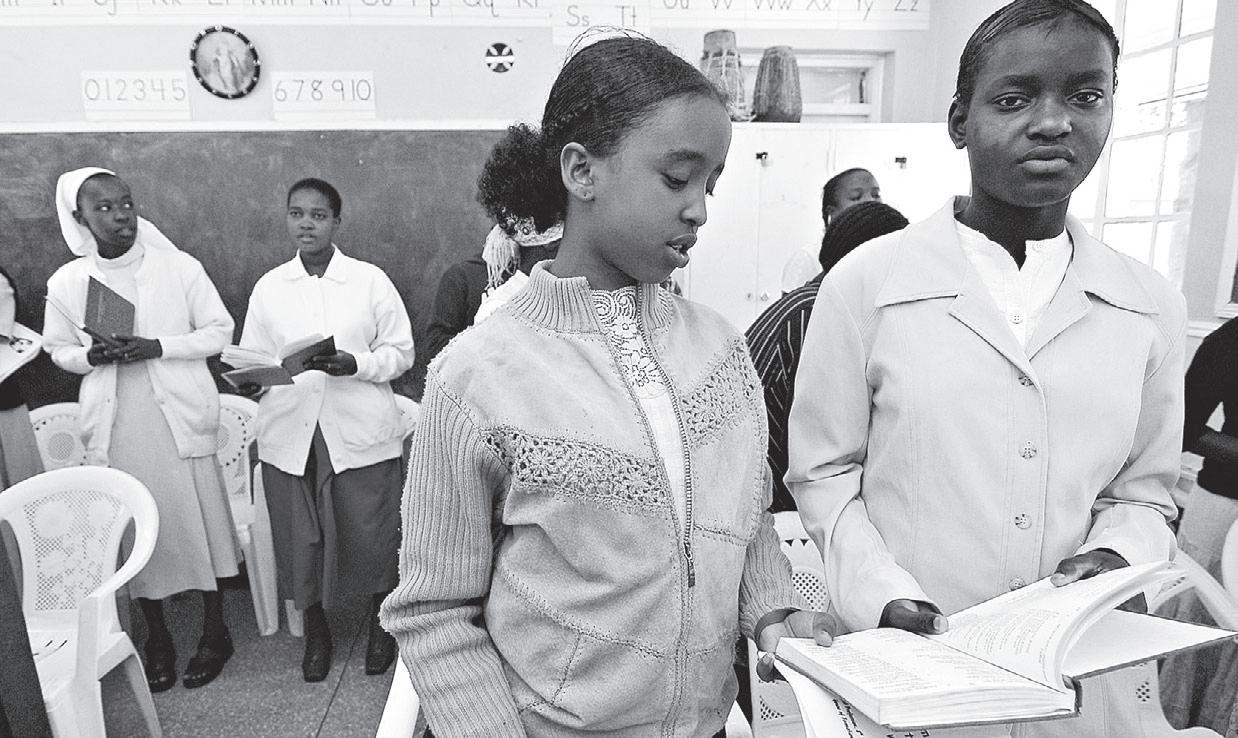
bank, soon died of a heart attack because of the family drama.
Mary sold everything she could to buy antivirals for her daughters. She coped for years with AIDS without medicines, until the day when, helped by the clinic, she was able to have virtually free access to the antivirals.
She received formation and experience in the field of a counsellor until she herself became a counsellor.
Casadei said: “Her experience and humanity is of great help for the sick; one thing is a counsellor who, after an examination, tells someone, I am sorry but you are positive and the latter begins to weep, to cry, to think of suicide, and quite another is to find a counsellor who says: Look, you are positive like me and so, you can live.”
Romania
In Romania, Casadei says, what is most striking are the numbers of children with AIDS.
Of the total of cases, 80 per cent are children under 16. They were infected between 1986 and 1990, when Romanian health care used contaminated products that infected some 5,000 to 6,000 children with AIDS.
They gathered the infected children in just one orphanage which became a veritable leprosarium.
Thanks to AVSI and other associations, Casadei continues, “we have tried to remove these children; we have returned many to their families.
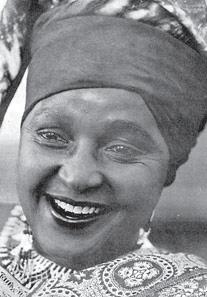
Where conditions of poverty and division prevented the children’s return, we have established family-homes.”
“We discovered that there were children 10 to 12-years-old whose parents were convinced they had died, because the regime singled them out as infected and told the parents to forget about them,” he added.
Casadei noted the lowering rates of AIDS currently seen in Uganda, which demonstrates the importance of maintaining a virtuous lifestyle, in which abstinence and fidelity to one person are critical points.
Regarding those who criticise the Church’s position on using a condom, Casadei said: “The debate on the condom has a totally ideological basis. In the 90s, Africans were very open to the prophylactic to obtain international funds.
“Now this widespread propaganda for use of the condom has caused a political-cultural reaction of hostility.”
He points out that many Africans, including Winnie Mandela, are promoting abstaining over condoms.
Casadei said that Nelson Mandela’s wife said at a conference on AIDS that “the first action to stop AIDS is to teach children to practise chastity.”
- ZenitIt’s the dreaded question tossed out at church picnics, baby showers and Sunday dinner with your Aunt Madge:
marriages that are built upon sacrifice and service.
“Aren’t you married yet?”
Or maybe you’ve fallen prey to its runner-up: “Why are you still single?”
■ A second argument suggests that somewhere along the line in the busyness of modern life, we began to see relationships not as vocation but as distraction from the very hard and real work of developing a relationship with oneself and God.
For some in the single-but-want-to-bemarried population, which is growing older and larger in this country and in our Church, it can be difficult not to take the question personally. It feels personal. It is personal. It touches our most vulnerable desires as human beings. And in the minds and hearts of single people, the question sometimes becomes, “What’s wrong with me?”
More and more Catholics are living single well into their 30s, 40s and beyond, ending up with more years of solitude than they may have hoped for and more years living with the question, “Why can’t I find a good Catholic to marry?”
The statistics paint the lie of the land.
In May 2005, the US bishops reported that never-married persons between 25 and 35 increased by 20 per cent over the past 30 years, suggesting more lifelong singlehood.
And it’s not just Catholics; more Americans are marrying later or not at all. According to the US Census Bureau, in 2005, there were nearly 100 million single people living in the that country. Australia is a nation that strongly resembles the US as well.
Between 1990 and 2000, the number of non-family households - meaning households with occupants who are not family members living together or persons living alone rose at twice the rate of households of immediate or extended families. In Massachusetts, Rhode Island, Louisiana, Mississippi, Nevada, New York and Washington, DC, with more states following close behind, the majority of households are currently made up of single people.
Why the trend?
What does this data mean for the life of the Church and for the meaning of life for 100 million people?
Schools of thought on the subject are beginning to emerge:
■ A third suggests that we don’t have a marriage crisis, but a commitment crisis in single and married vocations.
■ Still others suggest that from our increasingly consumerist worldview, we have lost the ability to fall in love with a person and instead spend our energies looking for companionable “products,” a package of features to be selected from a dating website’s menu, as if “tall, dark, and Catholic” could really capture the essence of a person rather than provide a place to enter into relationship.
Given the landscape, what’s a single Catholic person to do?
Time for formation
No matter the reasons for this growth in single living, if you fall into this population and have grown weary of building a life on your own, you are far from alone and far from having to resign yourself to singles’ bingo night in church basements. And while marriage may or may not be in your future, there are plenty of opportunities to live with purpose and impact if you so choose.
We look first to those breaking new ground, cutting new trenches. Anastasia Northrup, for example, has been the driving organisational force behind the US National Catholic Singles Conference, which had its second anniversary in February. More than 500 single people from around that country attended a threeday conference that month in Denver.

■ Some claim that a culture that produces divorce or separation in half of all marriages doesn’t have the muster to produce people who are prepared for a lifetime commitment. A culture that is wellversed in romance but mostly devoid in working examples of strong unions cannot produce
They poured into seminars and talks on the topic, met others struggling with the same questions and feelings of isolation and abandonment by the Church and gathered resource materials they could take back to their home parishes.
Just in case you’re curious, it was about a 2-1 split, women to men.



Northrup, who works for Our Father’s Will Communications, a publishing company based in Chicago that’s dedicated to promoting the theology of the body literature of Pope John Paul II, told OSV that one







■ 100 million - Number of unmarried and single Americans. This group comprises 44 percent of all US residents age 15 and over.
53 percent - Percentage of unmarried and single Americans who are women.
■ 64 per cent - Percentage of unmarried and single Americans who have never been married. Another 22 percent are divorced, and 14 percent are widowed.
■ 14.9 million - Number of unmarried and single Americans age 65 and over. These older Americans comprise 15 percent of all unmarried and single people.
■ 87 - Number of unmarried men age 15 and over for every 100 unmarried women in the United States.
■ 49 million - Number of households maintained by unmarried men or women. These households comprise 44 percent of households nationwide.
Source: United States Census Bureau
of the biggest questions unmarried people ask is if single life is really a vocation outside of religious consecration.
“The Church has only recognised two vocations with a capital ‘V,’ so the single life is a time when you have the opportunity to make a complete gift of yourself. You’re not committed in the same way married or consecrated people are, but you can use your freedom to become more the man or woman that God created you to be,” she said.
Northrup, 29 and single, said that the theology of the body helps singles to prepare for their vocation, no matter what it is, and to create a closer community within the Church.
“Our culture and our media are obsessed with living an independent life, pushing this idea, ‘What’s in it for me?’ and that mentality does nothing to help one prepare to make a complete gift of themselves to another person and to God,” she said.
The needs generated in such an environment are unique ones, Northrup said. “A huge portion of the Church is single, and it needs to be ministered to, at many different ages as well.”
Society of individuals
David Sloan, 44, who is single but dating exclusively, couldn’t agree more.
“Singles are the poorest of the poor in the West for the very simple reason that they are living outside of family life, and all life is family life,” he said. “The answer for all of this is
living in family, in community. That’s how we learn how to relate to one another.”
Sloan has dedicated the last several years of his life to developing singles ministry programs and literature for anyone who’s interested in “vocation formation.”
In the late 1990s, when he found himself struggling with what he characterises as “serial dating” and a somewhat “shabby lifestyle?’ he went to a chastity conference seeking instruction and accountability.
But the instruction was aimed at teenagers, and, as valuable as that was, he found himself asking “Who’s going to teach this to us, to adults?”
He was somewhat surprised when the answer that rose to the surface of his searching was, “I am.”
Sloan created God of Desire, an outreach dedicated to vocation formation for single people. He offers a dating-and-courtship program that can be administered in parishes and elsewhere based on a 12-steps/12 principles format.
His message is forthright and simple: “We’ve got to get out of our one-bedroom units and flats and into community. Radical privacy grows out of a culture of death and is lived more by those in the single life.”
Sloan’s work focuses on the societal shift from family living to single living. His website claims that “family life is being replaced by single life at a breakneck pace .... [In] 2005, for the first time a majority of American households are comprised of single people. Eighty
■ God of Desire: David Sloan, outlines a 12-step program for courtship, dating and vocation formation.
Visit www.godofdesire.org
■ Real Love Inc: Mary Beth Bonacci writes on the single life and theology of the body.
Visit reallove.net
■ Theology of the Body International Alliance (TOBIA): This support network provides information on study groups, materials and conferences related to Pope John Paul II’s teachings on the human body.
Visit the website at www.theologyofthebody.net
■ Matthew Kelly Foundation: The Australian writer and speaker’s organisation offers CDs, books and a variety of other materials that focus on becoming the “best version of yourself,” and helping those around you to do the same. Visit www.matthewkelly.org
years ago, 80 per cent of households were families. The marriage rate has dropped by half since 1970. We’re becoming something unfathomable - a society of isolated individuals, broken or breaking families, self-reliant and very lonely people.”
Living out a vocation
Sloan and his girlfriend, Jennifer Kilfin, have co-authored Renew Singles Ministry: Forming Married and Celibate Vocations by Bringing Singles into the Family Life of the Church, a 28-page booklet that Sloan hopes to develop into a fullfledged book. He said that he’s still growing comfortable with the topic and trying to communicate the problem as well as the solution. He is unconvinced, though, that there is something in the culture that is driving us to live in isolation.
“There are lots of people around to marry. The problem is that we lost our drive to vocation,” he said.
“We used to grow up hungering and thirsting for our vocations; we’ve grown disconnected from that. Once you spend enough years living a single life, it’s like a disease. We become habituated to satisfying only ourselves rather than giving ourselves away in vocation.”
Many singles in their 30s and 40s express a wish that the language of “vocation” and “calling” had been more concretely introduced to them in the more formative years of their lives.
One 34-year-old professor at an East Coast university commented, “I wish someone had handed me the pamphlet at age 24 and told me, OK, you’ve got 10 years or more on your own, make good use of it.”
Mary Beth Bonacci, 43, a Catholic speaker and writer, has been speaking and writing about “real love” from the time she was in university.
“Instead of pointing to the Church, we need to step forward in service to our parish-
es, to make ourselves more visible as a group,” Bonacci said. She encourages those in search of ways to capitalise on their single years to “Go to God, ask him what he wants you to do, ask it sincerely, repeatedly and insistently, because sometimes he likes that. Look around and take advantage of the opportunities that are around you.”
“It’s not God’s way to just swoop in and make everything perfect for us. He could raise men out of stones, but he doesn’t so we stay close to God in prayer, we keep our lives good now, we make good use of the time we have now.”
Despite the protests of some single people who feel they don’t have a place within their local parishes, the Church has been clear long enough on the role of single people within the life of the Church.
Addressing an audience in Melbourne in 1986, Pope John Paul II reminded single people of all ages that they have an important place within Church life. He also distinguished between the needs and charisms of “young adults” and single people.
“A parish must always try to widen its horizons and make a continual effort to be a community open to everyone,” the Pope said.
“It should look beyond its own boundaries to the wider community of the diocese and of the universal Church. For we belong to the Catholic Church, a Church which is truly universal. Single people and youth can make a very important contribution in this effort to look beyond the home parish.
“Single people who love Christ with a chaste and generous heart have their own gifts to bring to parish life,” he added. “Since they do not have the daily obligations of a
husband or wife and children, they often have more opportunities to help both the Church and society in general. Their own experience of single life can make them especially aware of those who are often forgotten and overlooked by society.”
Path to holiness
people that you need to grow in holiness into your life. I’ve got to believe that if marriage or certain relationships have not yet entered your life, then that’s not what God wants for us yet,” Kelly said. His forthcoming book, Perfecting Yourself will examine, among other things, a great poverty of friendship in our culture.
It is a sober and stirring charge, and one frequently promoted by internationally recognised author, speaker and fellow single, Matthew Kelly.
“To please the Lord” has love as its foundation. This foundation arises from a further comparison. The unmarried person is anxious about how to please God, while the married man is anxious also about how to please his wife. In a certain sense, the spousal character of “continence for the sake of the kingdom of God” is apparent here. Man always tries to please the person he loves. Therefore, “to please God” is not without this character that distinguishes the interpersonal relationship between spouses.
On the one hand, it is an effort of the man who is inclined toward God and seeks the way to please him, that is, to actively express his love. On the other hand, an approval by God corresponds to this aspiration. By accepting man’s efforts, God crowns his own work by giving a new grace. Right from the beginning, this aspiration has been his gift. “Being anxious how to please God” is therefore a contribution of man in the continual dialogue of salvation that God has begun. Evidently, every Christian who lives his faith takes part in this dialogue.
He said:” Problems are teachers of virtue.., everyone’s always trying to fix problems in the Church, but the problems in the Church are there to make us holy.”
“Walking this path to holiness, it’s lonely, it’s hard for good people to connect in our society.
“Our Church and our world desperately need single people to take singleness seriously, which means recognising that you will never have an opportunity like this again to serve.”
Kelly, 32, has been travelling the globe for more than a decade championing the “universal call to holiness’ or what he refers to as becoming the best version of yourself.
Acceptance, not understanding, is the key to a meaningful experience of being single, Kelly said.
“Singleness is an opportunity to serve,” he emphasised. “You’ve got to believe that God is going to draw the circumstances and
“People can endure anything once they understand their pur-
Perhaps Pope Benedict XVI said it best in his homily at the imposition of the pallium and conferral of the fisherman’s ring a little more than a year ago: “With great strength and great conviction, on the basis of long personal experience of life, I say to you... Do not be afraid of Christ! He takes nothing away, and he gives you everything,” the pontiff said.

“When we give ourselves to him, we receive a hundredfold in return. Yes, open, open wide the doors to Christand you will find true life. Amen.”
Liz Kelly is 39, single and writes from Massachusetts.




However, Paul observes that the man who is bound by the marriage bond “is divided” by reason of his family obligations (see 1 Cor 7:34). From this remark it apparently follows that the unmarried person would be characterised by an interior integration, by a unification that would allow him to dedicate himself completely to the service of the kingdom of God in all its dimensions.
This attitude presupposes abstention from marriage, exclusively for the sake of the kingdom of God, and a life uniquely directed to this goal. In a different way the “division” can also sneak into the life of an unmarried person. Being deprived of married life on the one hand, and on the other, of a clear goal for which he should renounce marriage, he could find himself faced with a certain emptiness.
The Apostle seems to know all this very well. He takes pains to specify that he does not want to lay any restraint on one whom he advises not to marry, but he gives this advice to direct him to what is worthy and


keeps him united to the Lord without any distractions. These words bring to mind what Christ said to his apostles..., according to the Gospel of Luke: “You are those who have continued with me in my trials [literally, ‘in temptations’], and I prepare a kingdom for you, as the Father has prepared for
The unmarried person, “being united to the Lord,” can be certain that his difficulties will be met with understanding: “For we do not have a high priest who is unable to sympathise with our weaknesses, but one who in every respect has been tempted as we are, yet without sinning” (Heb 4:15). This allows the unmarried person not so much to immerse himself exclusively in possible personal problems, but rather to include them in the great stream of the sufferings of Christ and of his Body, the Church.

- Pope John Paul II, address of July 7, 1982
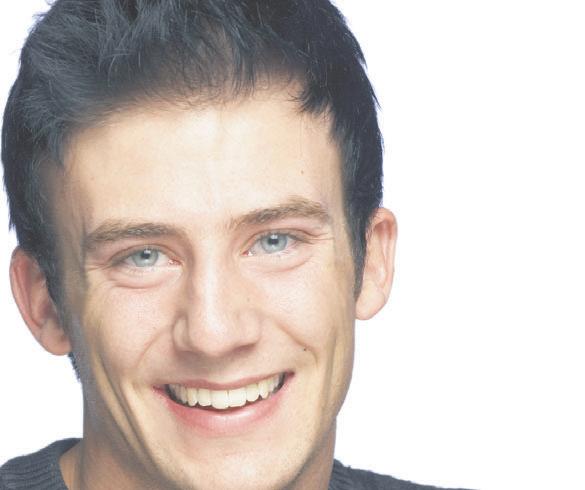

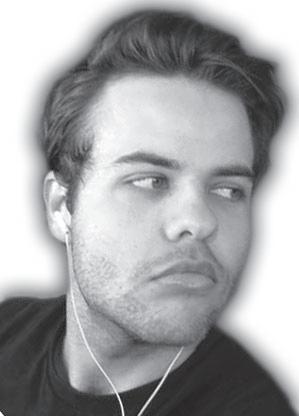 ■ With John Heard
■ With John Heard
One has to be careful when talking about bullies. As any sensitive teacher will tell you, often it is hard to pick the victim from the bully because the dynamic is always changing, or perhaps the bully is himself vulnerable, or maybe the victim is good at hiding her wounds.
Regardless, there is an added layer of weirdness applied whenever adults, especially principals, priests, teachers and others who make it their ‘business’ to care/know about children, enter the schoolyard level. Mistakes are made, subtle popcultural insight can be lacking in elders, what sounds like an insult might actually be a compliment; ‘you’re a sick bitch’ for instance.
Adults are not children and whenever we interfere with schoo-
lyard interactions we’re bound to make mistakes. We should not rush into bullying policies that might do more harm than good.
That’s not to say it’s always so murky. Some kids are picked on because they’re fat. I was. Some kids because they’re poorer than others in school. Still others find themselves targeted because they’re effeminate boys, masculine girls or suspected of being ‘gay’.
A rigorous bullying policy can be useful in identifying such obvious torments.
However, such a policy should recognise that bullying is best defeated by kids, especially kids empowered by their peers and confident of parental support.
Top-down programs, especially hyper-politically correct versions might attenuate the torment, but they won’t kill it.
Is it really any better to be bullied with the label ‘special needs’ than the more usually favoured slur ‘retard’?
Both taunts stigmatise and denigrate the subject; one just apparently sounds ‘nicer’.
This is one way that ostensibly good, certainly popular, but ultimately glib bullying policies might miss the point.
A ‘special needs’ kid, or even someone unfairly described as such
To my great delight my daughter came home from her religion classes (she has just been confirmed) with a beautiful Rosary that they were making in class while learning what the Rosary is and how to say it. It made me feel most remiss that I hadn’t taught her more about it myself. And then, to compound my guilt, I chanced upon a little old book called Bernadette and Lourdes, where of course the Rosary is the prayer that Bernadette prays with Our Lady. And in another little pamphlet about Fatima I found recently the absolute importance of the Rosary in our salvation is made very clear. The Holy Rosary, once the foundation of every Catholic’s prayer life,
Hermeneutics is the science of interpretation, especially of the Scriptures.
It respects both Revelation and Tradition and shuns any form of populist aspiration or the seeking of a consensus between opposing forces.
It attempts to discover, in a dignified manner, a modified way to live the Gospel in contemporary secularised society.
Catherine Parish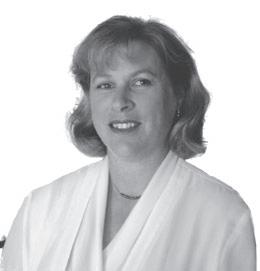
is a prayer many younger Catholics have hardly even heard of, let alone know how to pray. Adults of my age have heard of it and know it, but don’t pray it very often.
Our Blessed Lady has been very
Catholic teaching on human sexuality, the family and life will likely satisfy the more activist teachers’ unions but will provide little of real value for young people looking for moral direction.
expression is unduly restricted, a school’s bullying policy should not interfere with a child’s magnificent ability to cut through nonsense and call it by name (or a nickname).

I’d also query, in such situations, whether all bullying is bad. In a world where vast majorities disagree with things like gay adoption and ‘gay marriage’, it might be unrealistic or coddling to teach children that all of their parents’ ideas, no matter how relatively kooky, will be accepted with grace and humour by the thinking Catholic community and the wider world of voters, let alone by the local jocks.
What do I mean by this? I mean that a policy that bans use of obviously derogatory terms (derogatory to same sex-attracted males, blacks and women, terms like ‘faggot’, ‘nigger’, ‘slut’, etc.) from the classroom is straightforward but one that goes over the top and tries to police minds, stifle creativity or hamper the natural to and fro, however harsh-sounding, of youthful interaction is to be rejected.

No kid should be beaten up, but some ideas are fair game, certainly those ideas that are set up in opposition to Catholic truth.
by bullies, still knows she’s disliked. Similarly, bullies are too often bullied themselves, so strong families, coherent societies are also key. A politically correct bullying policy that borrows heavily from secular social mores but jettisons

Something about seeing a man take a man down the aisle, whether or not one party is in a white dress, makes kids giggle, indeed it makes adults blanche.
Sure, this means that some children will still be bullied, but no bullying policy can be entirely successful and it’s better to risk a few crushed egos, no matter how precious, than risk a sterile, mirthless, beige school environment stocked with Stepford Children.
Such a reaction is a crude version of the intellectual and spiritual aversion expressed by the Vatican, albeit in a more cerebral manner, via letters, exhortations, speeches, etc. Just as a truly plural State will not tighten religious vilification or discrimination laws to such an extent that religious beliefs and their
As Catholics too, surrounded by a world that often, and often deliberately, misconstrues some aspects of our faith and some comments by our leaders as an adult form of hectoring, where our Pope is often painted as a great bully, we must be sure that our bullying policies leave room for the Holy Spirit or at least a bit of harmless muckraking.
Otherwise our children will be retarded indeed.
“Our Blessed Lady has been very much neglected over the last 30 years or so; from being honoured, loved and revered by Catholics the world over; she has rather disapeared from view in our ordinary Catholic life,” writes Catherine Parish.
much neglected over the last 30 years or so; from being honoured, loved and revered by Catholics the world over; she has rather disappeared from view in our ordinary Catholic life, at least in the western world.
If the Church is God’s family, it is only right that a family have, as well as a Heavenly Father, a Heavenly Mother too.
Most children well understand the intercessory power of a mother with a father; especially when their request is a big or special one, or when they have been naughty. They know Mum can usually fix it for them, whether it be a heartfelt wish or amelioration of punishment! These reminders of
cal mouldings, both positive and negative.
Our Lady’s importance in our faith were strengthened even more by the Parish after-school religious program’s Mass on the feast of the Assumption. It was a quiet and reverent Mass, with a good sermon about Our Lady by Father. And then after Holy Communion the children sang ‘Gentle Woman.’ It brought tears to my eyes hearing the children’s voices lifting unselfconsciously in song along with the CD of what the singer had transformed into an appealing and meditative hymn.
No gentle mother, least of all Our Lady, could fail to hear those children and to love them for their simplicity in praying and honouring her; and to hear and love and
a way as to speak to the world of today and not that of yesterday.
reach out to the children’s parents also, who are trying to bring their children up to know, understand and believe in the great and wonderful Catholic faith.
It is our job now, as parents of young children, to teach them how to pray to their Mother Mary, as the great intercessor for us; to pray the Rosary not only as a comfort to help you sleep at night but as a powerful weapon in time of temptation, trouble or anxiety.
We have been given, through the Church, so many resources to draw upon to sustain us spiritually in this difficult world; the Rosary is one of the most powerful and we need to restore it to its previous prominence in Catholic prayer life.
It is an undeniable fact, and worth remembering at this moment, that every era has witnessed both loyalty and infidelity in relation to the message of Jesus Christ. There has never been and there will never be a perfect historical shaping of the Gospel message. Its inculturation will always be short of perfection. Successive periods in the history of the Church have inherited particular histori-
If we keep these ever-shifting realities in mind, new approaches can be discovered, to counteract the mere application of known strategies to ever changing societal circumstances.
The twin concepts of orthodoxy and orthopraxis are themselves in constant flux, as they attempt to understand the world of today. The quest for orthodoxy in the Church will not be achieved from falling back onto known, yet outdated, strategies, but in rethinking the essential elements of faith, in such
This is a very important task for the Church, which implies a revisitation of its primary sources, while bearing in mind modern cultural developments.
It may mean relinquishing historical aspects through which the message of Christ was presented in former eras. However, it is an attempt to rediscover the “deposit of faith,” not only in doctrinal terms but also in the form of pastoral outreach.
This task cannot be approached on an individual level.
Theology, the Magisterium of the Church and pastoral agents at differing levels must move in unity, in order to show the living face of Christ to the world of today.
It is the only way to negotiate the infinite variety of subjective identities and “belongings.”
The Church must not allow Christianity to be “auctioned off.” An attempt to refocus the Christian message on the life, death and resurrection of Jesus, would place the Church on a radical journey of self-discovery.
Tony Paganoni Scalabrinian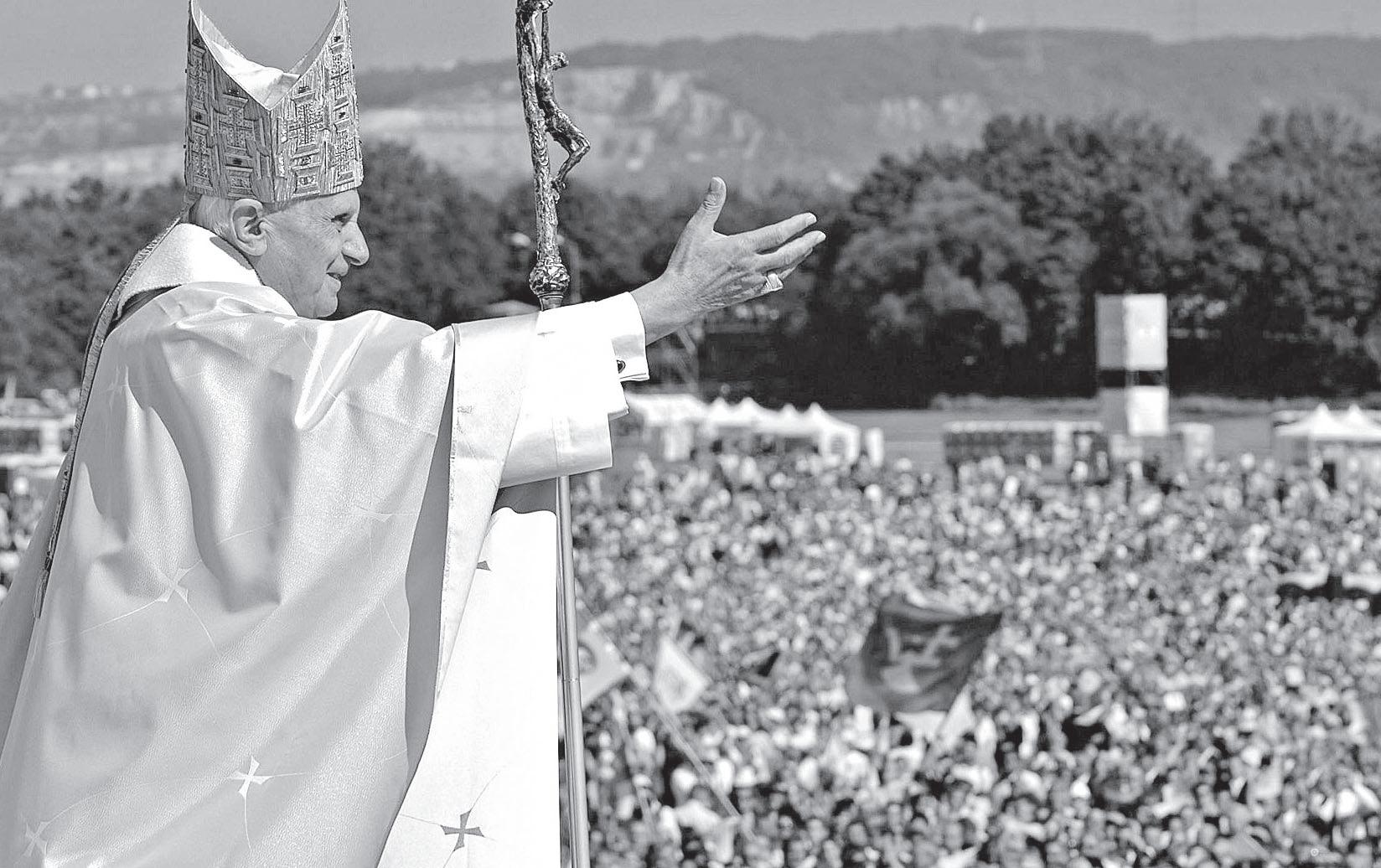
In scholarly lecture, Pope Benedict XVI reflects on the effects of the crisis between faith and reason
■ By John ThavisIn a lecture at the German university where he once taught theology, Pope Benedict XVI used a historical critique of Islamic violence to introduce a reflection on the crisis of faith and reason in the West.
The Pope began his address on September 12 by highlighting a 600-year-old discussion on Islamic “jihad” or holy war, quoting at length a Christian emperor who condemned Islam for spreading the faith “by the sword.”
But instead of critically assessing Islam, the Pope focused his attention on what he said was the West’s centuries-old tendency to “exclude the question of God” from the realm of reason.
This tendency to devalue religious thought, he said, makes it more difficult for the West to engage in the urgently needed dialogue of cultures and religions.
“A reason which is deaf to the divine and which relegates religion to the realm of subcultures is incapable of entering into the dialogue of cultures,” he said.
The Pope looked happy and relaxed as he returned to the University of Regensburg, where he taught dogmatic theology from 1969 to 1977.
About 1,500 of Germany’s leading academics greeted the pontiff with warm applause as he walked through the university’s great hall and took his place on a gilded chair in the centre of the stage.
To introduce the theme of his lecture, the Pope quoted from an account of a dialogue between the Byzantine Emperor Manuel II Paleologus and an unnamed Muslim scholar, sometime near the end of the 14th century. The Pope said the account was marginal to his theme, but that he found it interesting - particularly when the emperor touched upon the subject of Islamic holy war.
The Pope cited what the emperor told the Islamic scholar: “Show me
on to explain why spreading the faith through violence is unreasonable, because violence is incompatible with God and with the nature of the soul.
The Pope then pointed to a key question about Islam that is raised by the narrative: whether God is absolutely transcendent for Muslims, and therefore not bound up with “any of our categories, even that of rationality.”
The Pope did not offer an answer to that question. Instead, he went on to explore, in great detail, why Christian theology has come to affirm that faith is indeed based on reason and that acting unreasonably contradicts God’s nature.
Asked by reporters about the
“In the Western world the growing separation between faith and reason has resulted in a ‘dangerous state of affairs.”
just what Mohammed brought that was new, and there you will find things only evil and inhuman, such as his command to spread by the sword the faith he preached.”
Twice, the Pope emphasised that he was quoting someone else’s words.
The Pope said the emperor must have known of the early Islamic teaching that “there is no compulsion in religion,” but was no doubt also aware of later instructions in the Koran about holy war.
In the account, the emperor goes
papal text, Jesuit Father Federico Lombardi, the Vatican spokesman, said the Pope had no intention of giving “an interpretation of Islam as violent. I think everyone understands that even inside Islam there are many different positions and there are many positions that are not violent,” Father Lombardi said. He noted that the pope’s speech was primarily a historical analysis.
The Pope’s main point, developed in an academic style, was that in the Western world the growing separation between faith and rea-
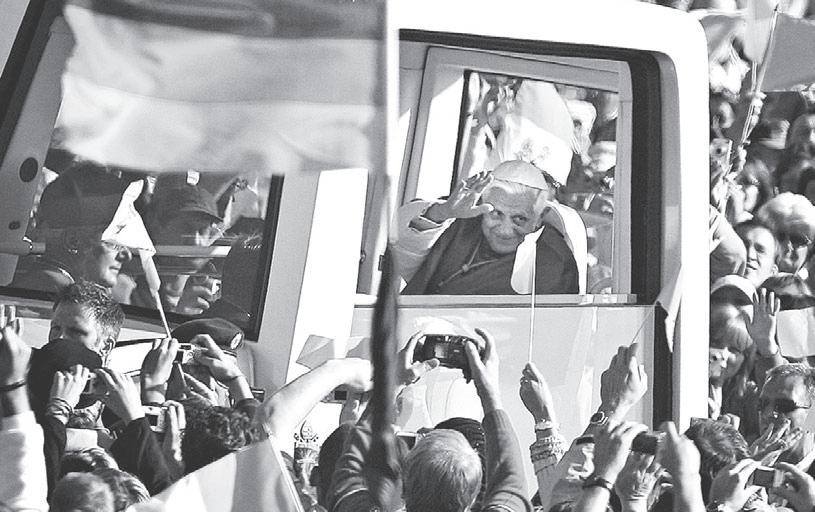
son has resulted in a “dangerous state of affairs for humanity,” in which society tries to construct a system of ethics without taking religion seriously and individuals try to make moral choices based solely on the subjective conscience. He said this was partly the result of a long process of “deHellenisation” of Christian theology, in stages marked by an overemphasis on Scripture, a reduction of the Gospel to a “humanitarian moral message” and the creation of a gulf between theology and scientific empiricism.
The Pope said his broad-brush “critique of modern reason” did not aim to turn back the clock or ignore the progress made and the new possibilities opened for humanity.
But the Church also sees dangers, he said, and believes they can be overcome “only if reason and faith come together in a new way.”
When the West invites others to a “dialogue of cultures,” it should
do so with the understanding that religion is an essential part of its own culture, he said. But in fact, he said, it is widely held in the Western world that the only authentic knowledge is scientific knowledge, and that religion is a purely subjective experience.
“The world’s most profoundly religious cultures see this exclusion of the divine from the universality of reason as an attack on their most profound convictions,” he said. The Pope said the West needs to recover the rightful place of philosophy and theology, so that it can say - like the Byzantine emperor who debated the Muslim scholar - that “not to act reasonably ... is contrary to the nature of God.”
The Vatican underlined the academic character of the Pope’s address by noting on the text handed out to journalists that a later version would be issued, complete with footnotes.


The look on Raik Matar’s face says it all. After 34 days of being unable to work in his engineering and contracting firm because of the war between Israel and the Hezbollah militia, he is now unable to pay his three employees, his monthly expenses and his own salary.
“The bank won’t take (my situation) into consideration. ... We already have work contracted. We just have to work with what we have to pass this difficult situation,” said Matar, who has owned his business for 15 years.
During the war, agricultural lands just outside Fassuta, an all-Melkite Catholic village, were flattened for use as an Israeli artillery base. Fifteen missiles fired by Hezbollah in Lebanon landed around the village and one inside the village, injuring a resident. Some 100 missiles also fell in and around the industrial area of the Melkite village of Mi’ilyah, a few miles away.
Fassuta is one of the closest Israeli towns to the Lebanese border - two miles away. Mi’ilyah, like its Jewish neighbour Ma’alot, is a mere 3.4 miles from the border. Yet, while neither Fassuta nor Mi’ilyah appear on the Ministry of
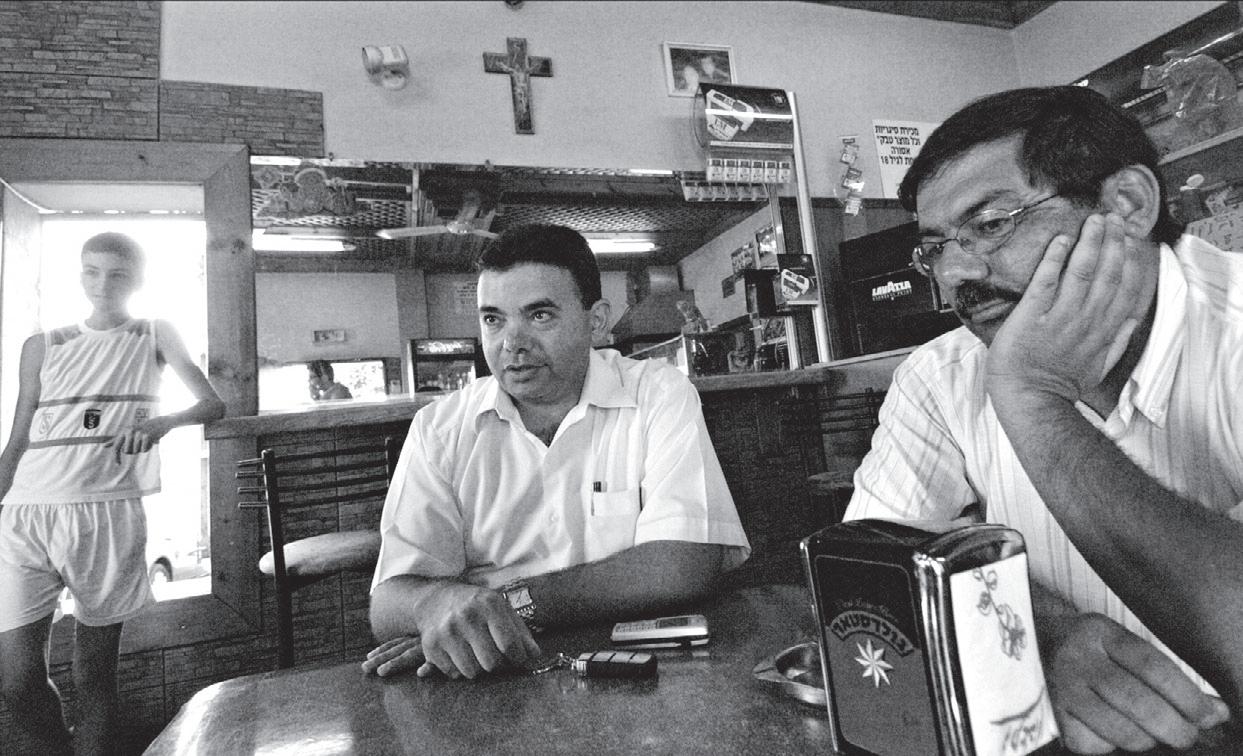
Interior’s list of border towns whose businesses will receive full compensation, businesses in Ma’alot and the Jewish town of Alkosh, 2.8 miles from the border, will be entitled to full compensation.
The only two other border towns not listed for full compensation are two Arab villages - Gush Halav and Arabe Al Aramshe - both of which also suffered missile attacks.
“I was not surprised to see the list,” said Matar, 45, the father of three children. “We are used to
being treated as second-class citizens. What makes me angry is that every time we need to get something we have to (fight) for our rights - even the most basic things. We always have to go to court for our rights.”
Businesses in Mi’ilyah and Fassuta have hired local lawyer Samuel Dakwar to present their case to the Israeli Supreme Court, and the case will be considered on September 17. A missile fell 500 feet from my pizzeria,” said Suleiman
Hallak, 35, whose restaurant is normally the centre of social activity for the youths of the village but was closed for the duration of the war.
“I almost went bankrupt.” Dakwar said. 10 years ago two criteria were set to determine how much compensation border towns would receive in cases of missile attacks: first, the town needs to be no more than 6.2 miles from the border; the second is how much of a target the village is. Since Fassuta, Mi’ilyah, Gush Halav and Arabe Al
Aramshe are all Arab villages, they were not considered to have been targets for the Hezbollah-launched missiles, he said.
“What difference does it make if the villages were hit by accident?” said Dakwar.
“They were hit. In Arabe Al Aramshe three people died; Mi’ilyah had two direct hits ... 40 percent of the Israeli civilians who died in this war were Arabs.”
“We hope the Supreme Court will right this wrong,” Dakwar said.
The 40 businesses he represents need to be paid twice as much as the $54,350 the government wants to pay them in order to be on a par with Jewish businesses in the same situation, said Dakwar.
For Nabil Muallem, 48, of Mi’ilyah, the war meant he had to sell one of his vans from his transport company, and he has gone into debt after having taken his four daughters and wife to Eilat and Bethlehem to escape the missiles.
“We had a very difficult situation here. One missile destroyed my sister’s house behind us,” said Muallem.
“We just want the government to pay us what they give to all citizens. We are closer to the border than even Ma’alot. It is the most difficult feeling a person can feel - that he is not equal.”
Muallem said he pays taxes, so he feels like he deserves equal compensation from the government. “We were hit by the missiles just like the Jewish towns,” he said CNS
In Geneva, Vatican calls for moratorium on use of cluster bombs
■ By Carol GlatzThe Vatican called for a moratorium on the use of cluster bombs, saying past and future victims of conflicts “cannot wait for years of negotiations and discussions.”
Archbishop Silvano Tomasi, the Vatican representative to Genevabased UN agencies, told governmental experts on September 1 that the maiming and death of tens of thousands of people as a result of the bombs’ submunitions necessitate immediate, concrete action.
“For that, a moratorium on the use of such arms is essential,” he said in his speech during an August 20-September 6 meeting in Geneva on the Convention of Conventional Weapons. The Vatican released a copy of the archbishop’s speech on September 7.
Cluster bombs eject multiple submunitions or bomblets, and their use during the recent war in Lebanon, Archbishop Tomasi said, “tragically demonstrates to us evidence of a humanitarian tragedy unfolding before our eyes.”
“The images and the testimonies reaching us are alarming,” he said.
UN experts so far have discovered 100,000 unexploded bomblets scattered throughout hundreds of different sites in Lebanon, many of them in residential areas.
By August 27, the unexploded munitions dropped during Israeli air strikes or fired by ground artillery had killed at least a dozen people and wounded at least 39 others, according to the UN Mine Action Coordination Centre.
Cluster bombs and submunitions are not banned by any international treaty, and many governments still consider them legitimate weapons.
Archbishop Tomasi said in his speech: “We have heard no convincing evidence from those who consider these arms to be legitimate. In any case, all arms are called legitimate before being prohibited or regulated.”
Just because a particular weapon is considered legitimate, he added, “does not make it more acceptable or less inhuman.”
Typically, cluster bombs open in midair and scatter dozens or hundreds of submunitions over a wide area.
A percentage of duds do not explode and can remain a threat for many years. They pose a particular danger to children, as they are easily attracted to the bomblets’ bright colourful casings, mistaking the volatile explosives for toys.
Nearly one week before Italian Cardinal Angelo Sodano was to retire, he published a book highlighting key addresses he made during 15 years of service as the Vatican secretary of state.
Titled “The Leaven of the Gospel: The Presence of the Holy See in the Lives of Peoples,” the 138-page hardcover volume is a sort of memoir meant to show the Vatican as an advocate promoting and protecting human dignity and trying to save souls.
The book, released on September 7 at a Vatican press conference, is written in Italian and contains 12 speeches the Italian cardinal made representing the Pope and the Vatican at various national and international venues, including the United Nations.
The book is dedicated to Popes John Paul II and Benedict XVI, the popes under whom Cardinal Sodano, 78, served. The author also gives a word of welcome to his successor, Italian Cardinal Tarcisio Bertone, who takes over on September 15.
Cardinal Sodano writes in the

book’s preface, “The time has come to hand over, like in the Olympic Games, the appointment” he received in 1990. At the press conference, Mgr. Gabriele Caccia, councillor for general affairs of the Vatican Secretariat of State, said there have always been questions about the Vatican’s role on the world stage.
Does the Church “only have a pastoral mission or also a political function?” he asked.
While the book does not give a black and white answer, he said, it does show that all the Vatican’s diplomatic activity, through its various nunciatures and papal representatives, is still carrying out the Church’s fundamental pastoral task: the saving of souls.
The Gospel message can and should be brought to all spheres of life and can make all human activ-
ity more enlightened and noble, he said. The Vatican is often the only state on the world stage whose agenda is not based on promoting the “particular interests of a person or peoples,” Mgr. Caccia said.
Mgr. Pietro Parolin, undersecretary of state for foreign relations, said at the same press conference that the Vatican’s nuncios and papal representatives play an important role “in defending the human being” and in strengthening the local churches, especially in regions where Christians face poverty, discrimination or other hardships.
When a political or social crisis threatens or erupts in a country or region, the Vatican’s diplomatic corps springs into action, looking for peaceful solutions to the problem or coordinating needed aid in the event of a tragedy.
Mgr. Caccia said that while the Church and the Vatican do “not magically solve every problem” their visible efforts of helping people demonstrate that “there’s a community that cares and can band together” to help anyone in need.
Mgr. Parolin added that the Vatican’s presence around the world shows people that the Church and the Pope are always near, that Christians - no matter how small their numbers - are not alone in the world.
As of September 6, Japan has a new little prince who, in his short life, has already headed off a constitutional crisis.
According to Japanese law, the imperial throne must pass through the male line. However, the imperial family has not been producing sons. The crown prince and princess have a daughter. The crown prince’s younger brother had two daughters until his wife gave birth to a boy on September 6. So, assuming that the newborn lad grows up healthy, Japan will be spared a succession crisis for at least another generation.
Until the latest pregnancy was announced, the government was floating the idea of allowing females not only to ascend the throne, but to have the succession pass to their offspring. Conservatives were aghast. Those conservatives are rejoicing at the new prince’s birth. So, too, are the media.
Much of the media fuss, of course, is due to the fact that news of this sort sells newspapers and magazines and attracts viewers. But, in fact, how much interest or excitement is there among the Japanese people?
Sometimes, it is important to notice what people fail to say. This is especially true when reading or

viewing news reports. We must keep questions in mind and see if the article or report answers them.
In the case of the newborn prince, the question is, “Who cares?”
The media have spoken of people waiting outside the hospital for the birth and of others rejoicing over it. Notably absent from the reports is any mention of how many people were waiting or who is doing the rejoicing. There are no photos of crowds. There have been no
parades or mass public demonstrations of rejoicing.
In fact, most Japanese do not care. The imperial family and system are so remote from the lives of people here that the birth of a new prince does not excite the mass of people. The birth of a panda at one of the nation’s zoos would certainly attract larger and more emotional crowds.
Of more concern is the kind of country Japan will be when the
newborn prince is ready to become emperor. On the same day the yet-to-be-named prince was born, the UN Population Fund issued a report that projects a drop of 16 million people, or 13 percent, in Japan’s population by the year 2050, about the time the boy is likely to take the throne. In fact, the Japanese government’s National Institute of Population and Social Security Research predicts an even sharper drop. CNS
An armor-plated popemobile used by Pope John Paul II during his 1982 visit to Great Britain has been sold at an auction for 37,000 pounds (US$70,000).
The converted bulletproof British Leyland vehicle, which had just more than 11,000 miles on the clock, was sold on September 2 in Dumfries, Scotland.
The popemobile was one of more than 2,000 items from the town’s Albion truck museum, founded by local resident Mick Hayton, who died earlier this year. Hayton bought the vehicle in 1998 for his museum, which has now closed.
A spokeswoman for the auction house Thomson Roddick & Medcalf told reporters on September 2 that no details of the buyer were available but added that interest had been “overwhelming,” with inquiries coming from around the world.
The sale price was about twice as high as expected, she said; the popemobile had been expected to sell for somewhere between 15,000-20,000 pounds (US$28,000-US$38,000).
One of two popemobiles built especially for Pope John Paul’s only visit to Great Britain, the Pope used the vehicle to travel to Scotland’s Bellahouston Park, Glasgow and Murrayfield.
Chilean church criticises guidelines authorising free contraceptives
Chilean Catholic Church leaders have criticised government guidelines authorising public health centres to distribute free contraceptives, including the morning-after pill, to minors older than 14 without parental consent.
In a statement on September 7, the Chilean bishops’ conference said
promoting contraceptives “will lead to the downfall of motherhood.
These regulations remind us of public policies imposed during totalitarian regimes that had the state regulate people’s private lives with authoritarian ... criteria” without their consent and “disregarding people’s dignity,” the bishops said.
The Health Ministry resolution was announced on September 2 and immediately criticised by Catholics, the conservative opposition and the Christian Democratic Party, a member of the ruling coalition.
Muslims knelt on prayer rugs in the Assisi town hall, Shintoists performed rituals in the garden of a Franciscan convent, and Buddhists meditated in a room full of Renaissance frescoes. Christians filled the town’s cathedral to pray until the tolling of the church bells called members of all faiths to an evening procession for peace through the streets of the medieval city.
The 70 minutes of prayer marked the central moment of the 20th annual Interreligious Prayer Meeting for Peace September 4-5, attended by more than 150 religious leaders from around the world. Like the original encounter in 1986, this one took place in
Those opposed to the morningafter pill consider it equivalent to abortion.
The guidelines make the morning-after pill Postinor-2 available for free, but require a prescription after counselling in primary health centres. Cardinal Francisco Errazuriz Ossa of Santiago, who also signed the bishops’ statement, called the guidelines a “blow to marriage, the birthrate and the family,” while Bishop Juan Gonzalez Errazuriz of San Bernardo warned that making the morning-after pill available
Assisi, the Italian hill town where St. Francis lived and preached. Sponsored by the Sant’Egidio Community, it featured numerous round-table discussions, separate prayer rituals and a joint appeal for peace delivered in front of the Basilica of St. Francis. “War is not unavoidable. Religions never justify hatred and violence. Those using the name of God to destroy others move away from true religion,” the appeal said.
On the 20th anniversary of the first interreligious prayer meeting in Assisi, Pope Benedict XVI said the initiative had been a “prophetic” way for various faiths to witness against conflict and war. The Pope said such gatherings were needed even
to everyone would lead to “greater promiscuity” in Chilean society.
Some mayors have said they would not comply with the guidelines, and two of them filed a recourse of protection in court against the Health Ministry.
Health Minister Maria Soledad Barria said those who violated the mandatory public health guidelines would be sanctioned.
The government justified its decision based on the number of teenage pregnancies and illegal abortions.
more today, when younger generations of all faiths must learn that prayer “does not divide, but unites” and that religion must never be used as an excuse for violence. The Pope made his comments in a message on September 4 to the 20th Interreligious Prayer Meeting for Peace in Assisi, Italy. Sponsored by the Sant’Egidio Community, the two-day encounter brought together more than 150 representatives of various world religions.
Church and government leaders should be humble, compassionate servants for their people and they should be capable of being both contemplative and proactive, Pope Benedict XVI said. St Gregory the Great, even though he lived in the Middle Ages,
According to Health Ministry data, teenagers are becoming sexually active at ages 15-17, and the teenage pregnancy rate is 16 percent and rising.
More than 13 percent of 14-yearold girls are already mothers. The statement from the bishops’ conference said the new regulations “deprive parents of their sacred obligation to educate, orient and accompany the lives of their children in the most distressing moments of their adolescence.”
is still an important example for today’s priests and public administrators, the Pope said before praying the noonday Angelus prayer on September 3, the feast day of the sixth-century Pope and doctor of the Church. The early Roman saint was unique, the Pope said. Early in his life, when he was prefect of the city of Rome, he stood out for his “administrative ability and moral integrity,” said the Pope. Despite holding an important and prestigious public office at only 30 years of age, St Gregory decided his calling was monastic life, the Pope said. On September 3, 590, however, St Gregory was torn away from his life as a monk and abbot when - much against his will - he was consecrated Pope. “He tried everything to avoid his election, but in the end he had to surrender,” the Pope said.
Children find the classics relevant and interesting if they are taught properly.■ By Ross Farrelly
Parents who wish their children to learn something of the classics of English literature at high school must be tearing their hair out in the state of Western Australia.
It would be a travesty if school students were directed to study the reality television show Big Brother during the precious few hours they have in the English classroom.
However the state’s curriculum council has gone one better, suggesting that students study the ads screened during this program.
This tragic situation is a result of the post-modern view that any text is as good as any other, that there is no absolute truth and that no books have anything meaningful to say about the human condition.
Homer Simpson is thought to be as good as Homer’s Odyssey and students end up wasting precious time watching the ads screened during Big Brother when they could be studying George Orwell’s 1984, thereby discovering the origin of the term.
In Australia’s wackiest postmodernists James Franklin says that it is difficult to formulate a workable alternative to post-modernism in academia. This may well be the case but in K-12 education it is not so difficult.
One example of an alternative to studying television ads is the Junior Great Books program. Earlier this year I visited Chicago, the home of the Great Books Foundation to attend a training course in this
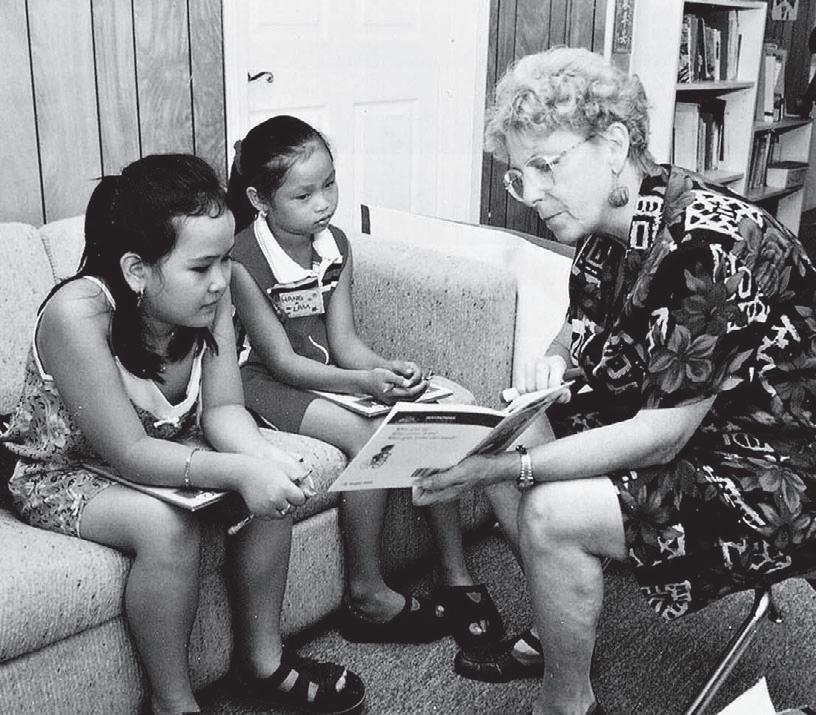
excellent program. Since then I have been running the program at my school and helping other teachers to trial the course in their classrooms.
The Junior Great Books program comprises a series of high quality texts from a variety of cultures.
Each story address a fundamental problem of human existence in a manner which is age-appropriate and attractive to the young reader.
The students study these stories in great depth. They listen to the teacher read the story aloud, make directed notes on the story and write compositions based on the linguistic features employed by the author.
The culmination of the study is a shared inquiry discussion, a disciplined group discussion which examines a single question raised by the text. Students are free to formulate responses but are encour-
aged to cite evidence from the text to back up their arguments. This approach assumes that the author has written something meaningful and worthy of sustained study and that the text under discussion holds some authority - a view that is the anthesis of the post-modern celebration of the death of the author.
The shared inquiry discussion is conducted according to four basic guidelines set down by the Great Books Foundation:
● Only those who have read the selection may take part in discussions.
● Discussions are restricted to the selection that everyone has read.
● Support for opinions should be found within the selection.
● Teachers may only ask questions - they may not answer them.
The advantage of this method
of collaborative learning, especially when the teacher rigorously follows the fourth rule of shared inquiry, is that the students get to see a living example of sustained intellectual curiosity. The importance of this cannot be overemphasised. Children learn much by example.
Teachers can tell their students that books are interesting and important but nothing is more powerful than seeing them actively engaged in careful examination of a piece of literature, striving to find meaning in it and actively pursuing an aspect of the story which they find personally meaningful.
This type of teaching, a form of Socratic dialogue suitably modified to meet the needs of primary students, has the added benefit of connecting students with this aspect of their heritage, the rational, open minded pursuit of truth which was introduced to the West in Classical Athens and which endures to this day.
The Junior Great Books Program comprises literature of the highest quality. The stories are selected with several criteria in mind. Obviously the stories must be well written.
If a traditional story such as a Grimm’s fairytale or one of Aesop’s Fables is selected, the retelling is very carefully chosen. The story must be profound enough to sustain at least four readings; it must be age-appropriate; and it must deal with an issue which is relevant, interesting and meaningful.
Furthermore, the stories chosen must be somewhat ambiguous. Morality tales do not lend themselves to lively debate while stories which can be interpreted in a number of ways encourage students to draw divergent conclusions and to justify their conclusions with reasoned arguments. For example, at
the beginning of a series aimed at eight and nine-year-old children, students study The Happy Lion, by Louise Fatio, which deals with the question of what makes a true friend, The Tale of Squirrel Nutkin, by Beatrix Potter, which deals with one’s approach to authority figures, How the Camel Got His Hump, by Rudyard Kipling, which deals with one’s duty towards society and Kanga and Baby Roo Come to the Forest and Piglet Has a Bath, by A. A. Milne, which raises the issue of dealing with strangers.
Each of these is accessible to primary students and opens up discussions on important and profound issues which children meet as they grow up.
Studying such texts prepares them for more difficult questions and helps make them more thoughtful, more considerate, more humane people.
Some critics assert that literature of the type found in the Junior Great Books program is irrelevant and boring. My experience is otherwise.
Because the texts embody fundamental questions which lie at the heart of the human condition, students find them incredibly relevant. It does take a certain amount of teaching skill and enthusiasm to involve all students in the discussion - but it is well worth the effort.
Finally, the study of good literatures refines children’s tastes. They develop a taste for leisure reading which makes them think, consider, reflect and reason. Big Brother and the accomanying advertisements lose their appeal. And this is no bad thing.
- Mercatornet
Ross Farrelly is a Sydney based educator and writer.
Some parishioners from Whitford, Toodyay, Northam and Maddington pressed ‘record’ on their video players on Sunday September 10, opting to spend some quality time with parishioners from St Isidore Church in Jennacubbine, rather than watch the ‘big game’ live.
Jennacubbine’s annual parish picnic day was celebrated by the two local Catholic farming families and their visitors with Mass followed by a sumptuous barbeque picnic beside the river that flows through the hosting family’s property.
A campfire and horse rides were enjoyed by all who participated, including celebrant for the day, Fr Geoff Aldous.
John Rayner, one of the visitors from Whitford parish, said it was a pleasure to support the two Jennacubbine families, who valiantly preserved their Catholic heritage, despite only being able to participate in the Holy Sacrifice
of the Mass twice a month. “This influx of visitors goes some way towards helping these most hospitable people maintain their Church,” he said.
Next year Jennacubbine parishioners will celebrate their Church’s centenary, which they hope will pack the little country Church with visitors.
“The centenary celebrations will be a tribute to those pioneer families who struggled to make a living from the land and who were determined to hold onto their Catholic heritage,” Mr Rayner said.
The day trip was one of many for the Whitford parish community, who have endeavoured to keep in contact with regional Catholics by visiting them for events throughout the year.
In the country: Cathy Bowen, at right, who was hostess for the day, and daughter enjoy the company of their visitors at the Jennacubbine Picnic. Meanwhile, Fr Geoff Aldous, at far right, chats with parishioners and visitors from Perth as everyone enjoys the food and hospitality.
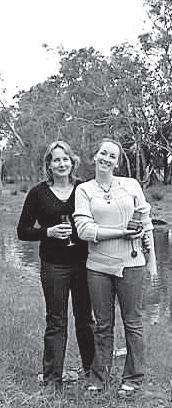
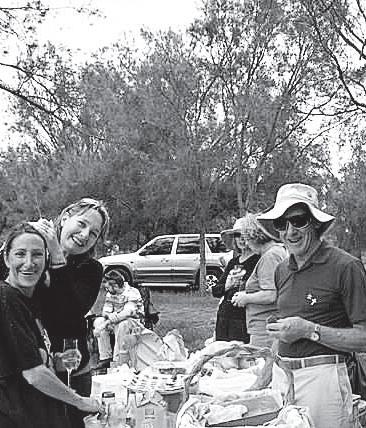
Well known Scarborough resident Reg Williams died on August 15 at the age 86 after a lifetime devoted to family, faith and community.
Born in North Perth in 1920, the only child of Arthur and Nelly Williams, he was one of that generation which lived through the Depression, served through World War II, and then gave a lifetime of witness to the power of Catholic family life.
Reg’s parents introduced him to the piano very early, developing a talent that he used throughout his life.
Like many of his contemporaries, Reg left school at 14. He began his working life in Economic Stores in Perth and it was there that he met his future wife, Monica Duffy. They shared a love for dancing and their friendship blossomed into romance.
In 1939, he enlisted in the militia, joining the 11th Battalion which was later transferred to the AIF.
Reg and Monica decided that the war would not stand in their way and married in January 1943 at St Columba’s Church, South Perth, but soon afterwards the war did intervene and Reg saw service in New Britain and Darwin, and later served as an instructor in Qld, NSW and Victoria, holding the rank of Warrant Officer 2.
After the war, Reg and Monica settled in the newly developing suburb of Scarborough, and remained there to raise their six children and live a full and happy life.
Reg was a foundation member of the choir in the fledgling parish of St John’s - which later become the Immaculate Heart of Mary Parish – and his keyboard skills saw him become the principal organist and choirmaster.
The enthusiastic group of singers provided many years of music not only for the liturgy but also for the memorable socials held in the parish hall. He finally retired as organist in 2002.
The first parish priest in Scarborough, Fr Edward McBride, had a strong influence on the young community as pastor and friend to all, and particularly on Reg’s devotion to Mary, the Mother of God.
When “Father Mac” introduced the Legion of Mary to the parish in 1952, Reg was a founding member, and enthusiastic contributor to the apostolic work of the Legion.
As his devotion to Our Lady and the Legion grew, he accepted terms of office on the local and regional praesidia, and from 1974 to 1980 he was president of the governing body, Senatus. It was during his term that the Legion achieved the remarkable goal of building its headquarters, Edel Quinn Centre in Windsor St, Perth. Reg served the Legion for
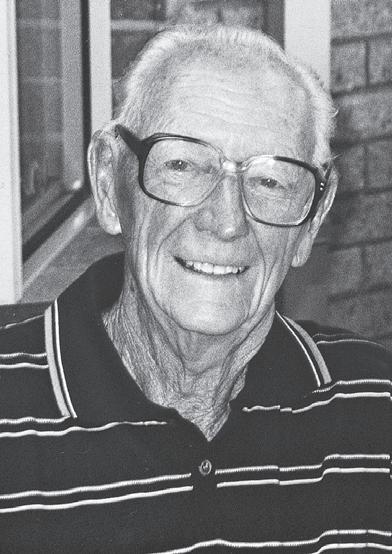
50 years and retired in mid-2002 because of failing health.
In 1977 he became one of the second group of Acolytes commissioned in the Archdiocese and served the parish in that role for 25 years.
In the mid-80s, he became one of the early graduates of the training for pastoral assistants at the Maranatha Institute.
In the mid-80s, he became one of the early graduates of the training for pastoral assistants at the Maranatha Institute.
Reg and Monica had great devotion to the Blessed Eucharist and together attended Mass daily. When parish priest Fr Frank Dillon introduced the Acolytes to the Church’s Daily Office, the morning and evening prayers became part of their daily devotions which they continued until shortly before his death.
Reg and Monica were married for 63 years. Their six children –Patricia Walsh, Jennifer Radisich, Gregory, Gabrielle Bell, Vincent and Stephen – all live in WA and enriched their parents’ lives with 18 grandchildren and six great grandchildren.
Reg was known for his sense of humour, which he maintained though his long illness and the last three months of his life which he spent in the Joondanna Village care facility where his snappy one-liners frequently amused the staff.
Several hundred people, most of them long-term friends, attended his Requiem Mass to share his family’s tribute to him as “a loving, generous man of peace who dedicated his life to serving his family, his faith and his community”.
The Mass, at St Bernadette’s Church, Glendalough on August 21, was concelebrated by Fr Brian McKenna and Fr Doug Harris.
The Julian Singers under choirmaster Chris DeSilva provided the choir. Both Reg and Monica had been members of the Julian Singers for many years.
Reg was cremated after a funeral ceremony at Karrakatta.
■ By Hilary AndersonCHICAGO (CNS) - Sister Rosemary Gira, a first-grade teacher at St Mary of the Angels in Chicago and a Sister of the Resurrection, is beginning her 51st year of doing what she loves best - teaching.
For the past 20 years she has been teaching at St Mary’s, where her order started teaching more than 100 years ago. She now is the only one in her congregation who still teaches in an elementary school.
“I always wanted to be a teacher,” said Sister Rosemary, who would not reveal her age. “I especially love teaching first-graders. They are so enthusiastic, want to learn and love doing homework.” She also enjoys teaching religion, noting that she loves “teaching the little children about Jesus and how he loves them.”
Sister Rosemary has seen many changes in the classroom over the years. These days, students have a variety of teachers for different subjects, but as she points out, that wasn’t always the case. “Back then we didn’t send our students to other classrooms,” she said. “We did it all in our own room.”
“Everything here is so modern, equipped with computers, too.” she said. The veteran teacher pointed out that computers are “good if they are used for educational purposes and not games. Otherwise, the young people should spend their time reading more.”
She also likes the fact that students are learning foreign languages. At St Mary’s they can take classes in Polish, French or Spanish.
In brief

Sister Rosemary said her family fostered her love of the Catholic faith. “My parents were very religious,” she told The Catholic New World, Chicago archdiocesan newspaper.
“Ours is a Resurrection family,” she added. “We all inspired each other. My older brother was a Resurrection priest. He influenced my decision to enter the community. My sister likewise entered the Resurrection congregation. She is now teaching at Resurrection High School.” Two of her brothers married, and two of their sons became priests. One is now a bishop in Panama. The other is a Resurrection priest in St Louis.
Sister Rosemary enjoys hearing from former students and their parents and keeps all of their cards and letters. In addition to teaching at St. Mary of the Angels, she has served at other schools in the Chicago area
and in Florida, Nebraska and Indiana.
She said her former students send her invitations to weddings, baptisms and other events. “It’s so inspiring to hear about their activities even though it’s been years since they were in my classroom,” she said.
Sister Rosemary often can be seen after school helping students with homework. In her spare moments she likes to read and write letters. She tells today’s parents the same things she did years ago: “Read to your children. Take time to listen to them and share their activities. Children need their parents’ time and love.”
The longtime teacher has no immediate plans to retire. She is too busy with her first-graders to think about doing anything else. “I just take it one day at a time,” she said, “and enjoy every minute.”
AMARILLO, Texas (CNS) - The Missionaries of the Gospel of Life celebrated several firsts in late August. The new priestly society got its first professed member and general moderator, accepted its first two seminarians and first five lay associates and broke ground for its first community residence. Father Frank Pavone, national director of Priests for Life, professed his permanent promises as founding member of the missionaries in the presence of Bishop John Yanta of Amarillo and Cardinal Renato Martino, president of the Pontifical Council for Justice and Peace at the Vatican, during a Mass at the Amarillo cathedral. In his first act as moderator general, Father Pavone formally accepted Patrick O’Donnell and Daniel Cochran as the new society’s first seminarians. He then received the promises of the society’s first five lay associates and introduced four men who have been accepted for a year of inquiry, a period of discernment whether they should seek acceptance into the society and enter the seminary.
HONG KONG (CNS) - A Chinese bishop recently released after more than 10 years of house arrest has expressed his desire to work for unity and reconciliation within the Diocese of Baoding. Auxiliary Bishop Francis An Shuxin of Baoding, who previously identified himself as a member of the underground church, told UCA News, an Asian church news agency based in Thailand, that he has now gained the government’s recognition of his position as a bishop and is permitted to do pastoral work openly under the government’s management. However, even though he is now part of the government-approved church, he said he has not joined the Chinese Catholic Patriotic Association and has not received an official identity card, UCA News reported. The bishop, who is now staying at the Anzhuang village church in Hebei province’s Xushui County, spoke to UCA News in early September, the news agency reported on September 12.
BALTIMORE (CNS) - As the bells toll and the doors of the Basilica of the Assumption in Baltimore open officially for the first time on November 4 after a two-year renovation, Fort McHenry on Baltimore’s harbour will fire three cannon volleys to salute the 200-year-old cathedral. The Fort McHenry Guard will participate along with the US Army Old Guard Fife and Drum Corps. During the weeklong bicentennial celebration, special events, religious services, open houses and tours will recognise the completion of the privately funded, $32 million restoration project. Pope Benedict XVI named Cardinal Francis Stafford, a Baltimore native and head of a Vatican court dealing with matters of conscience, to represent him.
NEW YORK (CNS) - Many may be surprised to learn that everyone’s favourite collie, Lassie - a longtime staple on American television - actually derives from a 1938 story set in pre-World War II England.
“Lassie” (Roadside/Samuel Goldwyn), the latest big-screen incarnation, is an exceedingly handsome adaptation of Eric Knight’s subsequent 1940 novel, Lassie Come Home, as was the first film version made in 1943 which starred the very young Elizabeth Taylor and Roddy McDowell.
An impoverished Yorkshire mining family - Sarah (Samantha Morton) and Sam Carraclough (John Lynch), and their young son, Joe (a very appealing Jonathan Mason) - reluctantly sells its beloved dog to a rich nobleman, the Duke of Rudling (Peter O’Toole), after the Duke’s young granddaughter, Cilla (Hester Odgers), admires the dog from afar.
Lassie tries to escape several times, much to the dismay of Rudling’s sadistic kennelman, Hynes (Steve Pemberton), an obvious and tiresome villain despite the film’s attempts to make him a partly comic and even slightly pathetic figure.
The following are capsule reviews of movies recently reviewed by the Office for Film & Broadcasting of the US Conference of Catholic Bishops.
■ from Catholic News Service
Crank
Noisy and endlessly unpleasant action film about a Los Angeles hit man (Jason Statham) who must keep in perpetual motion after he finds out that a rival thug (Jose Pablo Cantillo) has poisoned him with a substance designed to kill him within seconds if his heart rate drops. Co-writers and directors Mark Neveldine and Brian Taylor load on the bloody video-gamestyle action in an empty and mindless exercise. Excessive and graphic violence and gore, lewd sexual content, vulgar humour, recurring partial nudity, drug use and pervasive rough and crude language and profanity. The USCCB Office for Film & Broadcasting classification is O - morally offensive.

Joe is distraught over the loss of his pet, but Sarah and Sam do their best to convince him that they can’t adequately take care of the dog with money so scarce. In any case, Cilla is warmly empathetic to the dog,
and does her best to protect Lassie from Hynes’ cruelty.
The duke eventually takes the dog to Scotland, where the collie breaks free and begins the impossibly long trek back home, encoun-
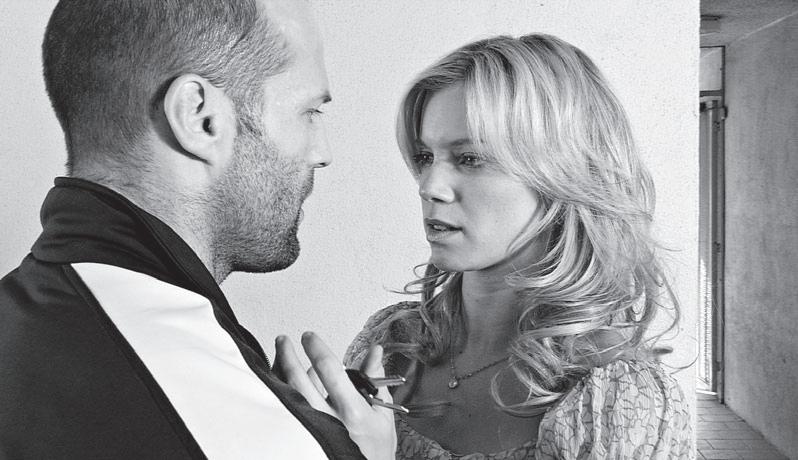
Dark speculative story about the mysterious death of George Reeves (a convincing Ben Affleck), the actor who played Superman on TV in the 1950s, as a fictional private eye (Adrien Brody) tries to determine whether the death was indeed suicide, or murder at the hands of his opportunistic starlet girlfriend (Robin Tunney), or by a studio executive with mob connections (Bob Hoskins) married to his paramour (Diane Lane). Director Allen Coulter’s film (from Paul Bernbaum’s fanciful script) will be of interest to fans of
the “Superman” series and those intrigued by Hollywood lore, but there are no conclusive answers, and the anachronistic expletives (the f-word and s-word were not used so commonly in the 1940s and ‘50s), and overdone sleazy milieu will be a turnoff to many.
Strong sexual themes, nongraphic sexual encounters including adultery, pervasive rough and crude language and profanity, some discreet violence with blood and partial shadowy nudity.
The USCCB Office for Film & Broadcasting classification is L - limited adult audience, films whose problematic content many adults would find troubling.
tering various characters along the way that either help or hinder her progress. In the former category are a sympathetic young couple, Jeanie (Kelly MacDonald) and Tom (Jamie Lee), who see Lassie being rounded
Uninspired remake of the 1973 cult thriller, here transposed from Scotland to the Pacific Northwest, about a policeman (Nicolas Cage) who, investigating the disappearance of a young girl, becomes entangled in the strange goings-on of a secretive island community of modern pagans led by a mysterious matriarch (Ellen Burstyn). Following the basic outline of the original, minus the eroticism and adding a feminist twist, director Neil LaBute generates some suspense in his cerebral approach, but overall the film is a bland and unnecessary retread, more hokey than creepy as the story progresses. Some disturbing images, including a burning human sacrifice, pagan rituals, an instance of rough language and scattered crude expressions and profanity. The USCCB Office for Film & Broadcasting classification is A-III - adults.
Take elements of “Harry Potter,” add some “Matrix”-style action sequences, a hip, impossibly goodlooking teenage cast and lots of rain and you get director Renny Harlin’s slick but vacant supernatural thriller “The Covenant” (Screen Gems).
up by two inept dog catchers and intervene, and a diminutive puppeteer, Rowlie (Peter Dinklage with a variable English accent), who puts Lassie in his travelling show.
Writer-director Charles Sturridge has assembled a top-line English cast (except for American Dinklage), including Edward Fox, John Standing, Robert Hardy and Jemma Redgrave, though some of their roles are quite small.
The scenic vistas (mostly on the Isle of Wight) are breathtaking, and the plot is ever appealing, making this highly recommendable family viewing.
Discerning adults may be bothered by a disjointed narrative (though the story is by its nature episodic), some plot turns that defy credulity, and an occasional awkwardness in both script and direction that places it several notches below the classic MGM version which was on the whole executed with more conviction.
The film contains a brief sequence of Lassie being beaten with a belt, a nongraphic scene where the miners urinate to throw some hunting dogs off the scent of an escaping fox, some mildly crass language, some mild violence and the death of a dog. The USCCB Office for Film & Broadcasting classification is A-I - general patronage.
Set in a New England boarding prep school, the tale centres on four warlocks - Caleb (Steven Strait), Pogue (Taylor Kitsch), Reid (Toby Hemingway) and Tyler (Chase Crawford) - all descendants of the infamous Salem witches, whose powers will increase exponentially when they reach magical maturity at age 18, as will the danger of becoming addicted to those powers.
As Caleb’s birthday approaches, they navigate jealousies within the group while battling a sinister student, Chase (Sebastian Stan), who wants their powers to augment his own.
The dank atmospherics can’t disguise a run-of-the-mill script which substitutes schlocky sorcery effects for story or any real suspense.
There are a couple of mildly spooky sequences - including one in which Caleb’s sleeping girlfriend (Sarah Wenham) wakes to find her dorm room infested with spiders - but overall there’s not much scary in the movie.
The film contains some supernatural violence, a few disturbing images, occult elements, rear nudity, sexually suggestive situations and humour, and recurring crude language. The USCCB Office for Film & Broadcasting classification is A-III - adults.
- CNS
■ BRICK REPOINTING
Phone Nigel 9242 2952.
■ PERROTT PAINTING PTY LTD
For all your residential, commercial painting requirements. Phone Tom
Perrott 9444 1200.
■ PICASSO PAINTING
Top service. Phone 0419 915 836, fax 9345 0505.
■ ALL AREAS
Mike Murphy 0416 226 434.
Classified ads: $3.30 per line incl. GST 24 hour Hotline 9227 7778 Deadline: 12pm Tuesday
■ DENMARK
Holiday House 3bdr x 2bath, sleeps up to 8. BOOK NOW.
Ph: Maria 0412 083 377.
■ CATHOLICS CORNER
Retailer of Catholic products specialising in gifts, cards and apparel for baptism, communion and confirmation. Ph: 9456 1777. Shop 12, 64-66 Bannister Road, Canning Vale. Open Mon-Sat.
■ RICH HARVEST YOUR CHRISTIAN SHOP
Looking for Bibes, CDs, books, card,
gifts statues, baptism/communion apparel, religious vestments, etc? Visit us at 39 Hulme Court (off McCoy St), Myaree, 9329 9889 (after 10.30am, Mon-Sat) We are here to serve.
■ HUMBLE MESSENGER
Shop 16/80 Barrack St (Inside Bon Marche Arcade) Perth WA 6000. Trading Hours: Tues-Fri 10am-5pm, Sat 10am3pm. Ph/Fax 92257199, 0421 131 7t16
■ REPAIR YOUR LITURGICAL BOOKS
Book repair service for all your favourites, Missals, Bibles, Liturgical Books. ph 9293 3092 or email from www.our. homewithgod.com/benedict/
■ ASSUMPTION CATHOLIC PRIMARY
The 25th Anniversary Committee of Assumption Catholic Primary School is seeking memorabilia for the historical display planned during a celebratory day in March 2007. If you are a past student, parent, staff member or have had a connection with our school and can contribute memorabilia or a story about our past, please contact Susannah Naim on 9534 8901. Email: naimps@bigpond.com. Mail: C/Assumption Catholic Primary School, PO Box 3130, Mandurah East WA 6210.
Classifieds Classifieds
must be
Sunday September 17
KOORDA CHURCH 50TH ANNIVERSARY
Our Lady of the Assumption Church at Koorda will celebrate its Golden Anniversary this year on September 17. Past Parish Priests and past parishioners are invited to come and join us for the celebrations. Anyone who has any photos they would like to include in a display is welcome to send them to Kath Gosper at PO Box 68, Koorda 6475. You could send copies or we will copy and return them to you. The day will commence with Mass at 10.30am, to be followed by lunch at the Recreation hall.
Sunday, September 17
ETERNAL WORD TELEVISION NETWORK ON ACCESS 31
10-11 am: : The New Testament : Gospels, Pt 2 / Scott Hahn & Jeff Cavins [Our Father’s Plan ; 11] 1-2 pm: In the Beginning was the Word / Fr Brian Mullady [EWTN 25th Anniversary Celebrations in San Francisco, California]. Your prayerful and financial support is needed.
Wednesday September 20
MENTAL HEALTH SUPPORT GROUP
The eastern Hills Mental Health Support Group that meets this Wednesday at Our Lady of Lourdes Hall, 207 Lesmurdie Rd, Lesmurdie will be having two guest speakers at their meeting. The topic is Panic attacks and Depression. The meeting which starts at 7.30pm is open to all people with mental illness, their family, carers and supporters.
Sunday September 24 to Saturday September 30
FIVE DAY DIRECTED RETREAT
At the Redemptorist Monastery Retreat House, 190 Vincent Street North Perth. Director: Fr Joe Carroll CSSR. For more information contact Jan Broderick.
Saturday September 23 – Sunday September 24
ANNUAL PILGRIMAGE OF THE CROSS
Volunteers are required to participate in carrying the cross from Midland to Gingin with 14 stations (or change of teams) along the way. The total distance is 69 km. The pilgrimage will begin in Midland 7.30 pm on Saturday and arrive at Gingin 2 pm on Sunday. Lunch and refreshments at Gingin. For more details: Sheila 9575 4023 or Fr Paul 95711839.
Friday September 29
HEALING FIRE BURNING LOVE
Our Lady of the Missions, 270 Camberwarra Drive Craigie, at 7.30pm. Fr Michael Brown OFM will be giving a talk on “Nothing can separate us from the Love of God’. Come and experience Jesus healing love during prayer and praise. Please contact Jenni Young on 9445 1028 for more information.
Saturday September 30
CATHOLIC MISSION
Thanksgiving Mass for Catholic Mission donors celebrating the missionary spirit of St Therese of Lisieux, Patroness of Missions at 9.30am in the Chapel of St Therese at the Catholic Pastoral Centre in Highgate. The celebrant will be Bishop Don Sproxton. For further information call Catholic Mission on 9422 7933 during office hours.
Tuesday October 3 – Tuesday October 10
A HEBREW CATHOLIC SPEAKS
Athol Bloomer a Hebrew Catholic will be speaking on Jewish Roots of Understanding the Divine Will at Casa di Luisa Piccarreta, 59 Newton St Spearwood on the following dates: Tuesday 3rd Oct 10.30am, 2.30pm. Tuesday 10th Oct 10.30am,
2.30pm. Wednesday 4th Oct 7.30pm -9pm. Thursday 5th Oct 7.30pm, 9pm. All talks will be different. Further information please phone Jenny/Michele 9494 2604.
Saturday October 7
A DAY WITH MARY
Holy Family Church, Lot 375 Alcock St, Maddington. 9am-5pm. A video on Fatima will be shown at 9am. A day of prayer and instruction based upon the messages of Fatima. Includes Sacrament of Penance. Holy Mass, Eucharistic Adoration, Sermons, Rosaries, procession of the Blessed Sacrament and stations of the cross. Please BYO lunch.
Sunday October 8
YARLOOP ST JOSEPH’S CHURCH CENTENARY
Con-celebrated Mass with Bishop Holohan. Yarloop Town Hall. Picnic lunch in the hall. Sausage sizzle avaliable. No alcohol. Contact the coordinator - 10 Anderson St, Yarloop 6218. Ph: 9733 5501. stjylp@yahoo.com.
Friday November 24
HEALING OF THE FAMILY TREE
Our Lady of the Missions, 270 Camberwarra Drive Craigie, at 7.30pm. Healing of the Family Tree Mass with Fr Michael Brown OFM. Experience deep inner healing and the freedom Jesus gives to those who love him. For more information contact Jenni Young on 9445 1028 or 040 4389 679. ‘Family Tree Booklets’ can be purchased at our healing services.
Sunday October 15
HEALING MASS
“Oh taste and see the Lord is good. He will satisfy the soul.” Catholic Charismatic Renewal invites you to come and experience the healing love of God through Prayer and Praise, the Eucharist and Praying over. The celebration will be held at St Joseph’s Church, 1 Salvado Road, Subiaco, commencing with Prayer and Praise at 5.30pm, Mass at 6pm followed by praying over and supper. All are very welcome to join us in this celebration. Enq. Celine 9446 2147.
Sunday October 29
WORLD CENTENARY OF CATHOLIC WOMEN’S LEAGUE
Members of the Catholic Women’s League of WA will be celebrating the Women’s League Centenary, founded in England by Margaret Fletcher in 1906. Mass will be celebrated at the Redemptorist Monastery, 190 Vincent Street, North Perth at 10.30am followed by a lunch at the Royal Park Hall at noon. Members, ex-members and their families are most welcome to attend. For more information contact Margaret Ph: 9328 8978 or Fay Ph: 9284 3084.
July - September
CROSS ROADS COMMUNITY
Term 3 Tuesday 25th July until Friday 29th
September for: Family & Friends Support Groups of Substance Abusers Wednesdays 7–9pm, Substance Abusers Support Groups Tuesdays 5.30 to 7.30pm
and Fridays Day Group for Substance Abusers 9.30am-2pm including Healing Mass Fridays at 12.30pm during term. Rosary Tuesday to Thursday 12.30 to 1pm. Lectio Divina on Tuesdays 7pm.
AL ANON FAMILY GROUPS
If a loved one’s drinking is worrying you – please call Al Anon Family Groups for confidential information meetings etc… Phone Number on 9325 7528 – 24 hrs.
ATTENTION COUPLES
Have you or your spouse been diagnosed with a mental illness? Depression? Anxiety/Panic Attacks? etc. Could you do with some help understanding your/their illness? Do you know how to get help when you need it? We can help you to help each other through the Unconditional Love Program. For more information contact Amanda Olsen: 0407 192 641, or email: mandyfolsen@bigpond. com.au.
TUESDAY NIGHT PRAYER MEETINGS
St Mary’s Cathedral Parish Centre, 450 Hay Street, Perth, 7pm. Come join us! Overcome the burdens in life making prayer your lifeline with Jesus. Personal healing in prayer, Rosary, meditation, Scripture, praise in song, friendship, refreshments. Be united with Our Lord and Our Lady in prayer with others. Appreciate the heritage of the Faith.
EVERY SUNDAY
Bullsbrook Shrine Sunday Pilgrimage Program. Shrine of Virgin of the Revelation, 36 Chittering Rd Bullsbrook. 2pm Holy Mass, exposition of the Blessed Sacrament with Holy Rosary. Reconciliation is available before every celebration. Enquiries: 9447 3292.
FIRST SUNDAY OF THE MONTH
The Santa Clara Parish Community welcomes anyone from surrounding parishes and beyond to the Santa Clara Church, corner of Coolgardie and Pollock Sts, Bentley on the 1st Sunday of each month for devotions in honour of the Divine Mercy. The afternoon commences with the 3 o’clock prayer, followed by the Divine Mercy Chaplet, Reflection and concludes with Benediction.
YOUNG CATHOLIC WOMEN’S INTERFAITH FELLOWSHIP
The Council for Australian Catholic Women (CACW) seeks to promote the participation of women in the Catholic Church in Australia. CACW is pleased to announce that the 2007 application package for the Young Catholic Women’s Interfaith Fellowship is now available. The package can be downloaded from the website: www.cacw.catholic.org.au. Michelle Wood is the contact person for the CACW in the Archdiocese of Perth. For further information regarding the CACW or the Fellowship, please contact Michelle: michelleww@iinet.net.au or 9345 2555.
NEW WEBSITE
Address for Holy Family Parish, Maddington is http://www.holycatholicfamily.org.au
ALCOHOLICS ANONYMOUS
Is alcohol costing you more than just money? Alcoholics Anonymous can help. Ring 9325 3566.
BLESSED SACRAMENT ADORATION
Holy Family Church, Alcock Street, Maddington. Every Friday 8.30 am Holy Mass followed by Blessed Sacrament Adoration till 12 noon. Every first Friday of the month, anointing of the sick during Mass. Enq. 9398 6350.
Wednesdays SIGN LANGUAGE COURSE
Australian Sign Language (Auslan) Classes are offered free of charge at Emmanuel Centre on Wednesdays at 1pm. If this does not suit you, other arrangements can be made. Please contact Fr Paul or Barbara at Emmanuel Centre, 25 Windsor St Perth 9328 8113.
QUEEN OF APOSTLES SCHOOL
If anyone has information on Queen of Apostles School, Riverton, used to go there or knows anyone who did please do one of the following to tell the extension group – Call 9354 1360 and ask to speak to Veronique or email your information to veronequeregnard@gmail.com.au or janellekoh@yahoo.com.au or you can put your information into the box in the office at Queen of Apostles School. Thanking you in anticipation.
Submissions over 55 words will be excluded. Inclusion is limited to 4 weeks. Events charging over $10 constitute a classified event, and will be charged acordingly. The Record reserves the right to decline or modify any advertisment.
We continue our series of reflections given by Pope Benedict XVI on the apostles. The Holy Father gave extensive consideration to the figure of St John, on whom he gave three talks.
Dear Brothers and Sisters, before the holidays I had begun sketching small portraits of the Twelve Apostles. The apostles were Jesus’ traveling companions, Jesus’ friends. Their journey with Jesus was not only a physical journey from Galilee to Jerusalem, but an interior journey during which they learned faith in Jesus Christ, not without difficulty, for they were people like us.
But for this very reason, because they were Jesus’ travelling companions, Jesus’ friends, who learned faith on a journey that was far from easy, they are also guides for us, who help us to know Jesus Christ, to love him and to have faith in him.
I have already commented on four of the Twelve Apostles: Simon Peter; Andrew, his brother; James, the brother of St John; and the other James, known as “The Less,” who wrote a letter that we find in the New Testament.
And I had started to speak about John the Evangelist, gathering together in the last catechesis before the holidays the essential facts for this apostle’s profile.
I would now like to focus attention on the content of his teaching. The writings that we want to examine today, therefore, are the Gospel and the letters that go under his name.
If there is one characteristic topic that emerges from John’s writings, it is love. It is not by chance that I wanted to begin my first encyclical letter with this apostle’s words, “God is love (Deus caritas est); he who abides in love abides in God, and God abides in him” (1 John 4:16). It is very difficult to find texts of this kind in other religions. Thus, words such as these bring us face to face with an element that is truly peculiar to Christianity.
John, of course, is not the only author of Christian origin to speak of love. Since this is an essential constituent of Christianity, all the New Testament writers speak of it, although with different emphases.
If we are now pausing to reflect on this subject in John, it is because he has outlined its principal features insistently and incisively. We therefore trust his words. One thing is certain: He does not provide an abstract, philosophical or even theological treatment of what love is.
No, he is not a theoretician. True love, in fact, by its nature is never purely speculative but makes a direct, concrete and even verifiable reference to real persons. Well, John, as an apostle and a friend of Jesus, makes us see what its components are, or rather, the phases of Christian love, a movement marked by three moments.
The first concerns the very source of love which the apostle identifies as God, arriving at the affirmation that “God is love” (1 John 4:8,16). John is the only New Testament author who gives us definitions of God. He says, for example, that “God is spirit” (John 4:24) or that “God is light” (1 John 1:5). Here he proclaims with radiant insight that “God is love.”
Take note: It is not merely asserted that “God loves,” or even less that “love is God!” In other words: John does not limit himself
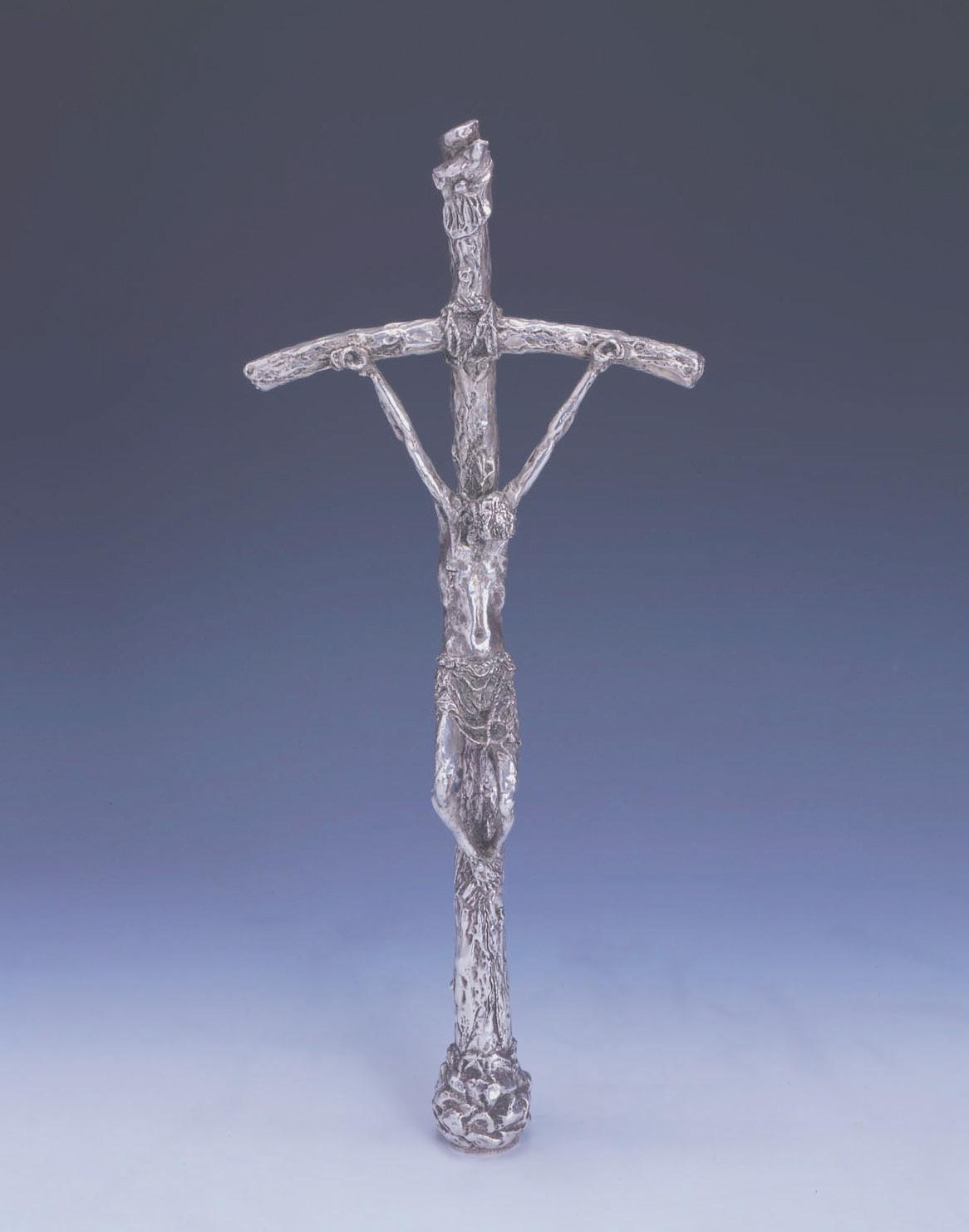
to describing the divine action but goes to its roots. Moreover, he does not intend to attribute a divine quality to a generic and even impersonal love; he does not rise from love to God, but turns directly to God to define his nature with the infinite dimension of love.
“If there is one characteristic topic that emerges from John’s writings, it is love.”
By so doing, John wants to say that the essential constituent of God is love and hence, that all God’s activity is born from love and impressed with love: All that God does, he does out of love and with love, even if we are not always immediately able to understand that this is love, true love.
At this point, however, it is indispensable to take another step and explain that God has concretely demonstrated his love by entering human history through the person of Jesus Christ, incarnate, dead and risen for us.
This is the second constitutive moment of God’s love. He did not limit himself to verbal declarations but, we can say, truly committed himself and “paid” in the first person.
Exactly as John writes, “God so loved the world,” that is, all of us, “that he gave his only Son” (John 3:16). Henceforth, God’s love for humanity is concretised and manifested in the love of Jesus himself.
Again, John writes: “Having loved his own who were in the world, he loved them to the
end” (John 13:1). By virtue of this oblative and total love we are radically ransomed from sin, as St John writes further: “My little children ... if any one does sin, we have an advocate with the Father, Jesus Christ, the righteous; and he is the expiation for our sins, and not for ours only but also for the sins of the whole world” (1 John 2:1-2; cf. 1 John 1:7).
This is how Jesus’ love for us reaches us: by the pouring out of his own blood for our salvation!
The Christian, pausing in contemplation before this “excess” of love, cannot but wonder what the proper response is. And I think each one of us, always and over and over again, must ask himself or herself this.
This question introduces us into the third moment of the dynamic of love:
From being the recipients of a love that precedes and surpasses us, we are called to the commitment of an active response which, to be adequate, can only be a response of love.
John speaks of a “commandment.” He is, in fact, referring to these words of Jesus: “A new commandment I give to you, that you love one another; even as I have loved you, that you also love one another” (John 13:34).
“A new commandment I give to you, that you love one another; even as I have loved you, that you also love one another.”
Where is the newness to which Jesus refers? It lies in the fact that he is not content with repeating what had already been requested in the Old Testament and which we also read in the other Gospels: “You shall love your neighbour as yourself” (Luke 19:18; cf. Matthew 22:37-39; Mark 12:29-31; Luke 10:27).
In the ancient precept the standard criterion was based on man (“as yourself”), whereas in the precept to which John refers, Jesus presents his own person as the reason for and norm of our love: “As I have loved you.”
It is in this way that love becomes truly Christian: Both in the sense that it must be directed to all without distinction, and above all since it must be carried through to its extreme consequences, having no other bounds than being boundless.
Those words of Jesus, “as I have loved you,” simultaneously invite and disturb us; they are a Christological goal that can appear unattainable, but at the same time they are an incentive that does not allow us to ensconce ourselves in what we have been able to achieve. It does not permit us to be content with what we are but spurs us to keep advancing toward this goal.
In The Imitation of Christ, that golden text of spirituality which is the small book dating back to the late Middle Ages, on this subject is written: “The love of Jesus is noble and generous: It spurs us on to do great things, and excites us to desire always that which is most perfect. Love will tend upward and is not to be detained by things beneath. Love will be at liberty and free from all worldly affections ... for love proceeds from God and cannot rest but in God above all things created. The lover flies, runs and rejoices, he is free and not held. He gives all for all and has all in all, because he rests in one sovereign good above all, from whom all good flows and proceeds”
(Thomas à Kempis, “The Imitation of Christ,” III, V, 3-4).
What better comment could there be on the “new commandment” spelled out by John? Let us pray to the Father to be able, even if always imperfectly, to live it so intensely that we share it with those we meet on our way.
